Steve Jobs Leadership Analysis
VerifiedAdded on 2020/05/04
|18
|4280
|40
AI Summary
This assignment requires a thorough analysis of Steve Jobs' leadership style and its influence on Apple's innovative trajectory. Students must examine his charismatic qualities, persuasive communication techniques, and the strategies he employed to foster creativity and drive organizational change within Apple.
Contribute Materials
Your contribution can guide someone’s learning journey. Share your
documents today.
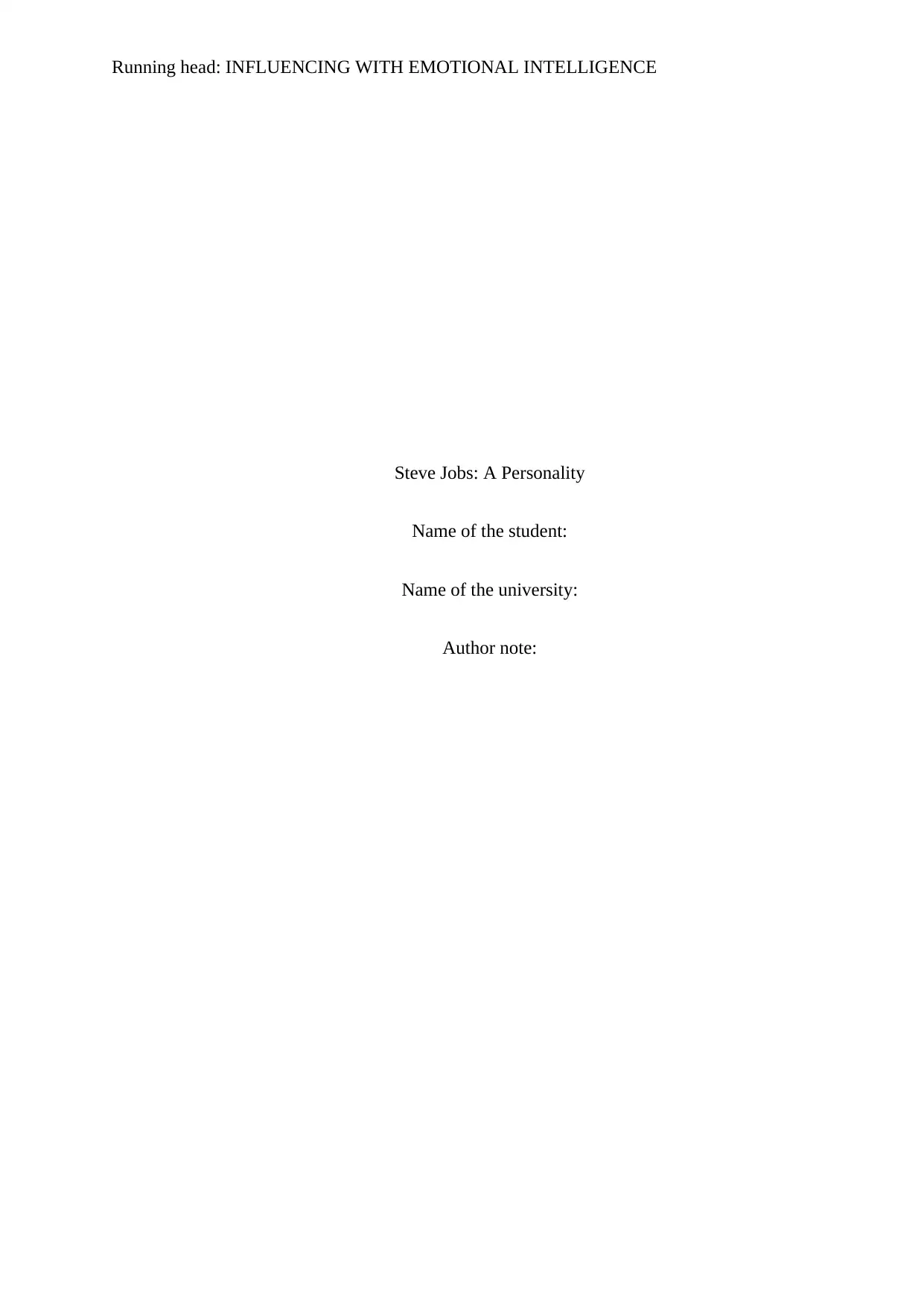
Running head: INFLUENCING WITH EMOTIONAL INTELLIGENCE
Steve Jobs: A Personality
Name of the student:
Name of the university:
Author note:
Steve Jobs: A Personality
Name of the student:
Name of the university:
Author note:
Secure Best Marks with AI Grader
Need help grading? Try our AI Grader for instant feedback on your assignments.
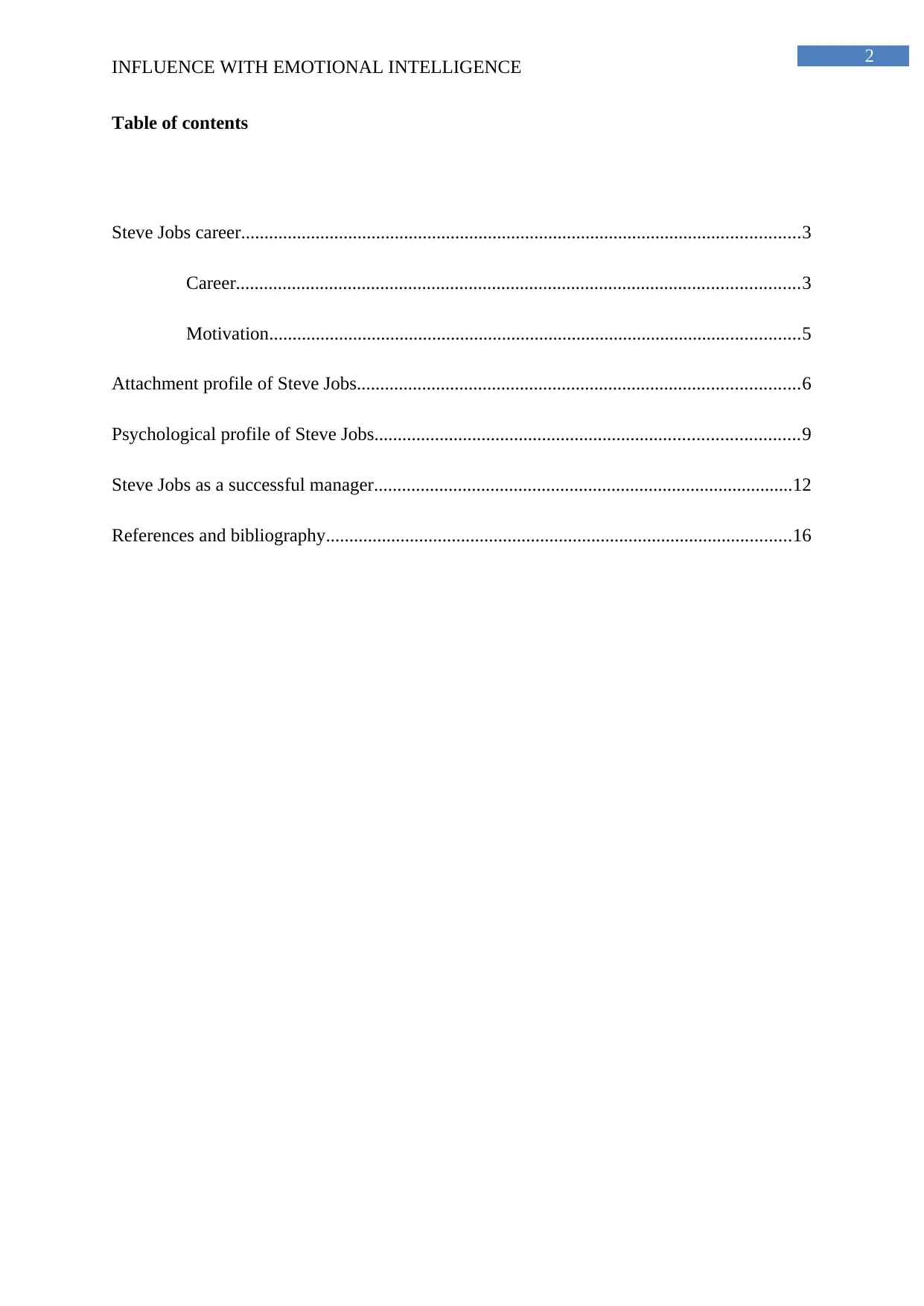
2
INFLUENCE WITH EMOTIONAL INTELLIGENCE
Table of contents
Steve Jobs career........................................................................................................................3
Career.........................................................................................................................3
Motivation..................................................................................................................5
Attachment profile of Steve Jobs...............................................................................................6
Psychological profile of Steve Jobs...........................................................................................9
Steve Jobs as a successful manager..........................................................................................12
References and bibliography....................................................................................................16
INFLUENCE WITH EMOTIONAL INTELLIGENCE
Table of contents
Steve Jobs career........................................................................................................................3
Career.........................................................................................................................3
Motivation..................................................................................................................5
Attachment profile of Steve Jobs...............................................................................................6
Psychological profile of Steve Jobs...........................................................................................9
Steve Jobs as a successful manager..........................................................................................12
References and bibliography....................................................................................................16
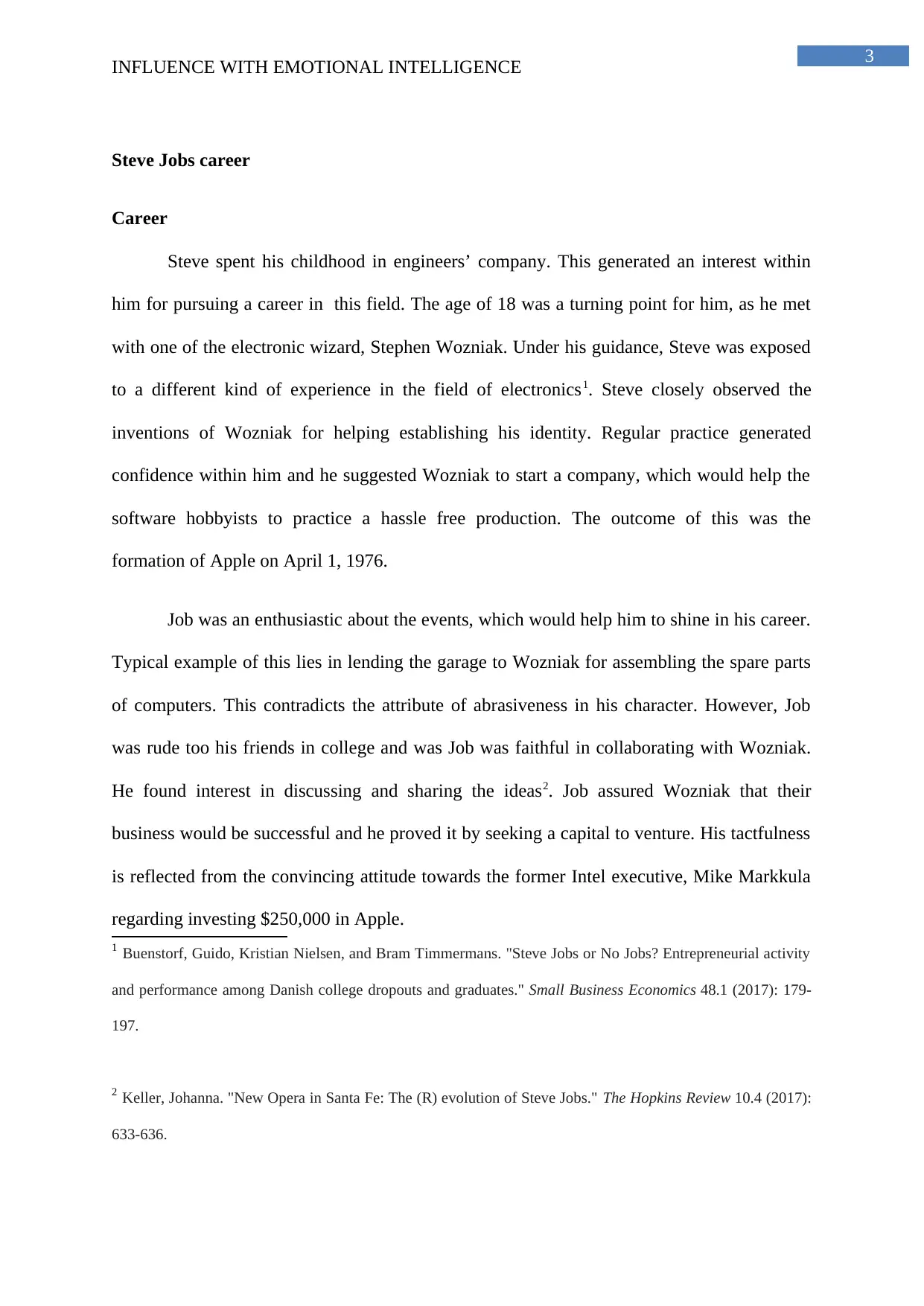
3
INFLUENCE WITH EMOTIONAL INTELLIGENCE
Steve Jobs career
Career
Steve spent his childhood in engineers’ company. This generated an interest within
him for pursuing a career in this field. The age of 18 was a turning point for him, as he met
with one of the electronic wizard, Stephen Wozniak. Under his guidance, Steve was exposed
to a different kind of experience in the field of electronics1. Steve closely observed the
inventions of Wozniak for helping establishing his identity. Regular practice generated
confidence within him and he suggested Wozniak to start a company, which would help the
software hobbyists to practice a hassle free production. The outcome of this was the
formation of Apple on April 1, 1976.
Job was an enthusiastic about the events, which would help him to shine in his career.
Typical example of this lies in lending the garage to Wozniak for assembling the spare parts
of computers. This contradicts the attribute of abrasiveness in his character. However, Job
was rude too his friends in college and was Job was faithful in collaborating with Wozniak.
He found interest in discussing and sharing the ideas2. Job assured Wozniak that their
business would be successful and he proved it by seeking a capital to venture. His tactfulness
is reflected from the convincing attitude towards the former Intel executive, Mike Markkula
regarding investing $250,000 in Apple.
1 Buenstorf, Guido, Kristian Nielsen, and Bram Timmermans. "Steve Jobs or No Jobs? Entrepreneurial activity
and performance among Danish college dropouts and graduates." Small Business Economics 48.1 (2017): 179-
197.
2 Keller, Johanna. "New Opera in Santa Fe: The (R) evolution of Steve Jobs." The Hopkins Review 10.4 (2017):
633-636.
INFLUENCE WITH EMOTIONAL INTELLIGENCE
Steve Jobs career
Career
Steve spent his childhood in engineers’ company. This generated an interest within
him for pursuing a career in this field. The age of 18 was a turning point for him, as he met
with one of the electronic wizard, Stephen Wozniak. Under his guidance, Steve was exposed
to a different kind of experience in the field of electronics1. Steve closely observed the
inventions of Wozniak for helping establishing his identity. Regular practice generated
confidence within him and he suggested Wozniak to start a company, which would help the
software hobbyists to practice a hassle free production. The outcome of this was the
formation of Apple on April 1, 1976.
Job was an enthusiastic about the events, which would help him to shine in his career.
Typical example of this lies in lending the garage to Wozniak for assembling the spare parts
of computers. This contradicts the attribute of abrasiveness in his character. However, Job
was rude too his friends in college and was Job was faithful in collaborating with Wozniak.
He found interest in discussing and sharing the ideas2. Job assured Wozniak that their
business would be successful and he proved it by seeking a capital to venture. His tactfulness
is reflected from the convincing attitude towards the former Intel executive, Mike Markkula
regarding investing $250,000 in Apple.
1 Buenstorf, Guido, Kristian Nielsen, and Bram Timmermans. "Steve Jobs or No Jobs? Entrepreneurial activity
and performance among Danish college dropouts and graduates." Small Business Economics 48.1 (2017): 179-
197.
2 Keller, Johanna. "New Opera in Santa Fe: The (R) evolution of Steve Jobs." The Hopkins Review 10.4 (2017):
633-636.
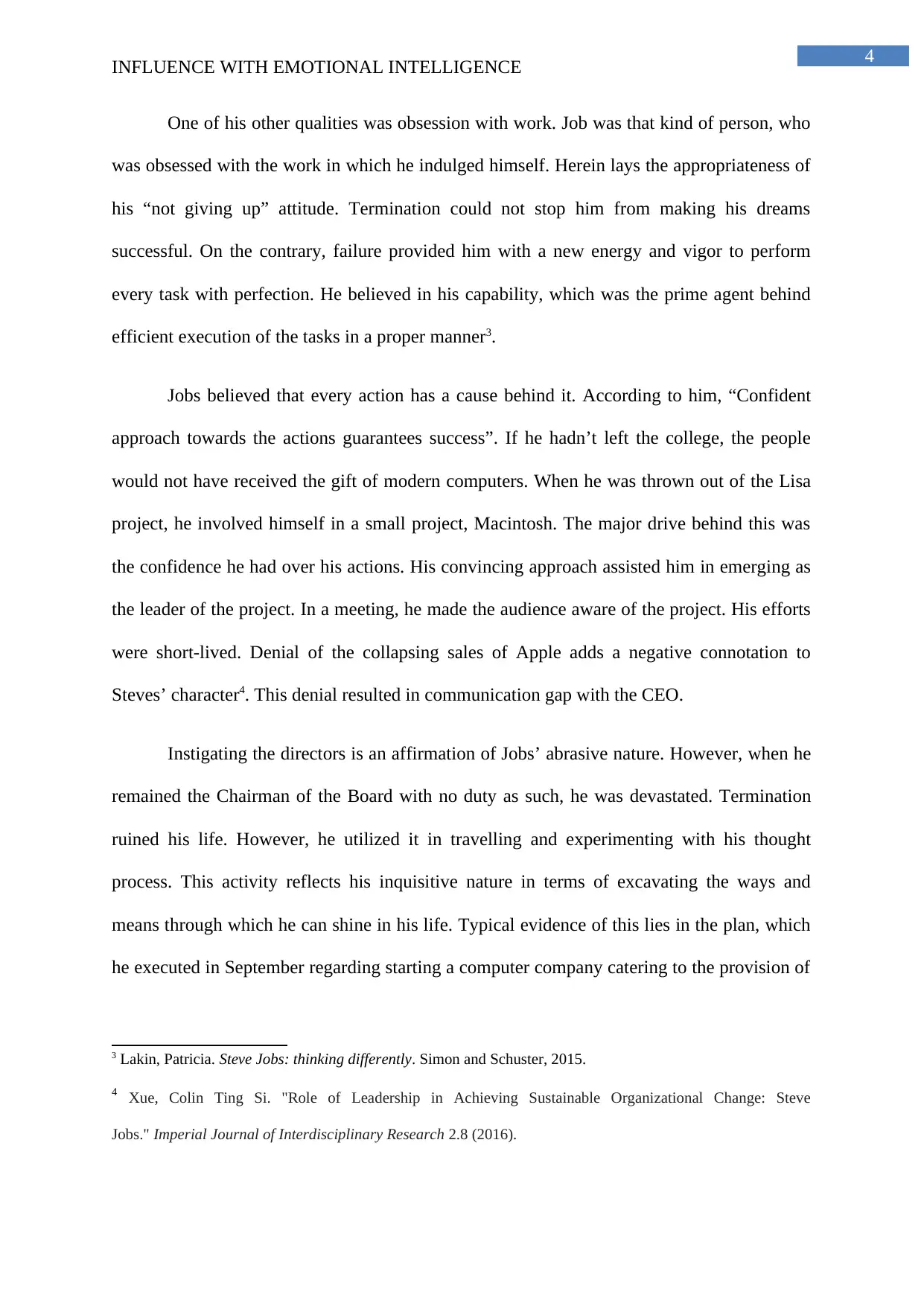
4
INFLUENCE WITH EMOTIONAL INTELLIGENCE
One of his other qualities was obsession with work. Job was that kind of person, who
was obsessed with the work in which he indulged himself. Herein lays the appropriateness of
his “not giving up” attitude. Termination could not stop him from making his dreams
successful. On the contrary, failure provided him with a new energy and vigor to perform
every task with perfection. He believed in his capability, which was the prime agent behind
efficient execution of the tasks in a proper manner3.
Jobs believed that every action has a cause behind it. According to him, “Confident
approach towards the actions guarantees success”. If he hadn’t left the college, the people
would not have received the gift of modern computers. When he was thrown out of the Lisa
project, he involved himself in a small project, Macintosh. The major drive behind this was
the confidence he had over his actions. His convincing approach assisted him in emerging as
the leader of the project. In a meeting, he made the audience aware of the project. His efforts
were short-lived. Denial of the collapsing sales of Apple adds a negative connotation to
Steves’ character4. This denial resulted in communication gap with the CEO.
Instigating the directors is an affirmation of Jobs’ abrasive nature. However, when he
remained the Chairman of the Board with no duty as such, he was devastated. Termination
ruined his life. However, he utilized it in travelling and experimenting with his thought
process. This activity reflects his inquisitive nature in terms of excavating the ways and
means through which he can shine in his life. Typical evidence of this lies in the plan, which
he executed in September regarding starting a computer company catering to the provision of
3 Lakin, Patricia. Steve Jobs: thinking differently. Simon and Schuster, 2015.
4 Xue, Colin Ting Si. "Role of Leadership in Achieving Sustainable Organizational Change: Steve
Jobs." Imperial Journal of Interdisciplinary Research 2.8 (2016).
INFLUENCE WITH EMOTIONAL INTELLIGENCE
One of his other qualities was obsession with work. Job was that kind of person, who
was obsessed with the work in which he indulged himself. Herein lays the appropriateness of
his “not giving up” attitude. Termination could not stop him from making his dreams
successful. On the contrary, failure provided him with a new energy and vigor to perform
every task with perfection. He believed in his capability, which was the prime agent behind
efficient execution of the tasks in a proper manner3.
Jobs believed that every action has a cause behind it. According to him, “Confident
approach towards the actions guarantees success”. If he hadn’t left the college, the people
would not have received the gift of modern computers. When he was thrown out of the Lisa
project, he involved himself in a small project, Macintosh. The major drive behind this was
the confidence he had over his actions. His convincing approach assisted him in emerging as
the leader of the project. In a meeting, he made the audience aware of the project. His efforts
were short-lived. Denial of the collapsing sales of Apple adds a negative connotation to
Steves’ character4. This denial resulted in communication gap with the CEO.
Instigating the directors is an affirmation of Jobs’ abrasive nature. However, when he
remained the Chairman of the Board with no duty as such, he was devastated. Termination
ruined his life. However, he utilized it in travelling and experimenting with his thought
process. This activity reflects his inquisitive nature in terms of excavating the ways and
means through which he can shine in his life. Typical evidence of this lies in the plan, which
he executed in September regarding starting a computer company catering to the provision of
3 Lakin, Patricia. Steve Jobs: thinking differently. Simon and Schuster, 2015.
4 Xue, Colin Ting Si. "Role of Leadership in Achieving Sustainable Organizational Change: Steve
Jobs." Imperial Journal of Interdisciplinary Research 2.8 (2016).
Secure Best Marks with AI Grader
Need help grading? Try our AI Grader for instant feedback on your assignments.
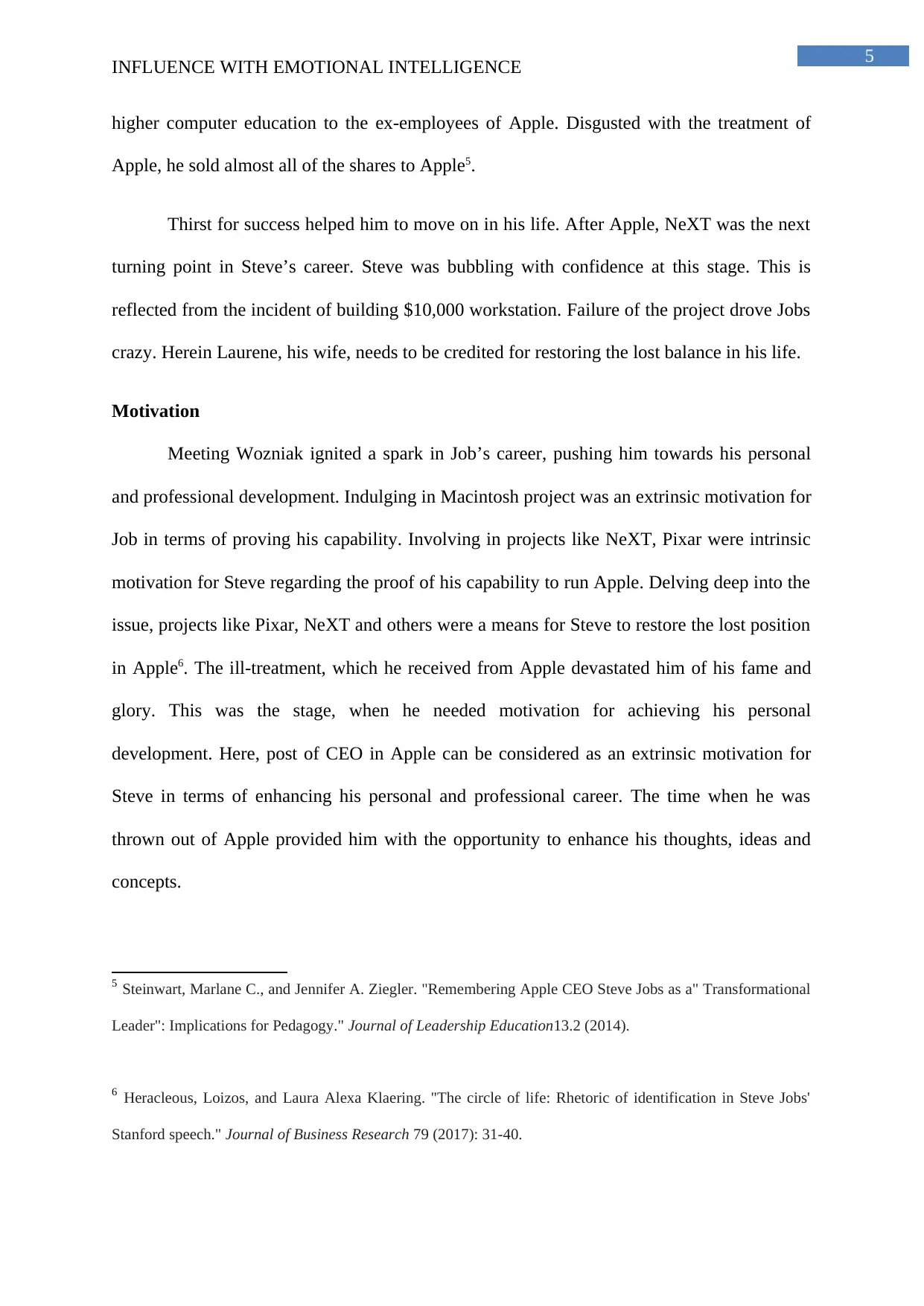
5
INFLUENCE WITH EMOTIONAL INTELLIGENCE
higher computer education to the ex-employees of Apple. Disgusted with the treatment of
Apple, he sold almost all of the shares to Apple5.
Thirst for success helped him to move on in his life. After Apple, NeXT was the next
turning point in Steve’s career. Steve was bubbling with confidence at this stage. This is
reflected from the incident of building $10,000 workstation. Failure of the project drove Jobs
crazy. Herein Laurene, his wife, needs to be credited for restoring the lost balance in his life.
Motivation
Meeting Wozniak ignited a spark in Job’s career, pushing him towards his personal
and professional development. Indulging in Macintosh project was an extrinsic motivation for
Job in terms of proving his capability. Involving in projects like NeXT, Pixar were intrinsic
motivation for Steve regarding the proof of his capability to run Apple. Delving deep into the
issue, projects like Pixar, NeXT and others were a means for Steve to restore the lost position
in Apple6. The ill-treatment, which he received from Apple devastated him of his fame and
glory. This was the stage, when he needed motivation for achieving his personal
development. Here, post of CEO in Apple can be considered as an extrinsic motivation for
Steve in terms of enhancing his personal and professional career. The time when he was
thrown out of Apple provided him with the opportunity to enhance his thoughts, ideas and
concepts.
5 Steinwart, Marlane C., and Jennifer A. Ziegler. "Remembering Apple CEO Steve Jobs as a" Transformational
Leader": Implications for Pedagogy." Journal of Leadership Education13.2 (2014).
6 Heracleous, Loizos, and Laura Alexa Klaering. "The circle of life: Rhetoric of identification in Steve Jobs'
Stanford speech." Journal of Business Research 79 (2017): 31-40.
INFLUENCE WITH EMOTIONAL INTELLIGENCE
higher computer education to the ex-employees of Apple. Disgusted with the treatment of
Apple, he sold almost all of the shares to Apple5.
Thirst for success helped him to move on in his life. After Apple, NeXT was the next
turning point in Steve’s career. Steve was bubbling with confidence at this stage. This is
reflected from the incident of building $10,000 workstation. Failure of the project drove Jobs
crazy. Herein Laurene, his wife, needs to be credited for restoring the lost balance in his life.
Motivation
Meeting Wozniak ignited a spark in Job’s career, pushing him towards his personal
and professional development. Indulging in Macintosh project was an extrinsic motivation for
Job in terms of proving his capability. Involving in projects like NeXT, Pixar were intrinsic
motivation for Steve regarding the proof of his capability to run Apple. Delving deep into the
issue, projects like Pixar, NeXT and others were a means for Steve to restore the lost position
in Apple6. The ill-treatment, which he received from Apple devastated him of his fame and
glory. This was the stage, when he needed motivation for achieving his personal
development. Here, post of CEO in Apple can be considered as an extrinsic motivation for
Steve in terms of enhancing his personal and professional career. The time when he was
thrown out of Apple provided him with the opportunity to enhance his thoughts, ideas and
concepts.
5 Steinwart, Marlane C., and Jennifer A. Ziegler. "Remembering Apple CEO Steve Jobs as a" Transformational
Leader": Implications for Pedagogy." Journal of Leadership Education13.2 (2014).
6 Heracleous, Loizos, and Laura Alexa Klaering. "The circle of life: Rhetoric of identification in Steve Jobs'
Stanford speech." Journal of Business Research 79 (2017): 31-40.
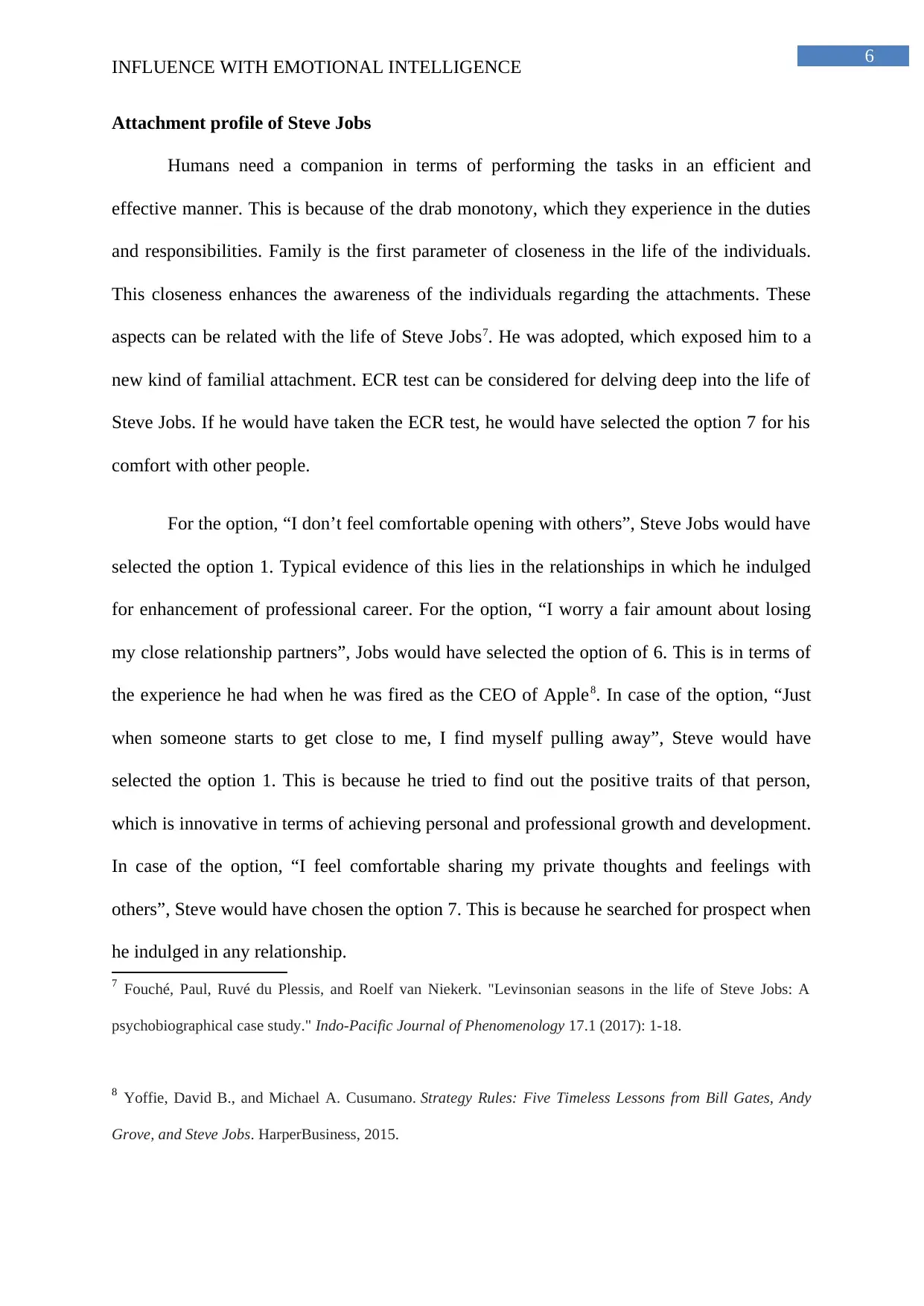
6
INFLUENCE WITH EMOTIONAL INTELLIGENCE
Attachment profile of Steve Jobs
Humans need a companion in terms of performing the tasks in an efficient and
effective manner. This is because of the drab monotony, which they experience in the duties
and responsibilities. Family is the first parameter of closeness in the life of the individuals.
This closeness enhances the awareness of the individuals regarding the attachments. These
aspects can be related with the life of Steve Jobs7. He was adopted, which exposed him to a
new kind of familial attachment. ECR test can be considered for delving deep into the life of
Steve Jobs. If he would have taken the ECR test, he would have selected the option 7 for his
comfort with other people.
For the option, “I don’t feel comfortable opening with others”, Steve Jobs would have
selected the option 1. Typical evidence of this lies in the relationships in which he indulged
for enhancement of professional career. For the option, “I worry a fair amount about losing
my close relationship partners”, Jobs would have selected the option of 6. This is in terms of
the experience he had when he was fired as the CEO of Apple8. In case of the option, “Just
when someone starts to get close to me, I find myself pulling away”, Steve would have
selected the option 1. This is because he tried to find out the positive traits of that person,
which is innovative in terms of achieving personal and professional growth and development.
In case of the option, “I feel comfortable sharing my private thoughts and feelings with
others”, Steve would have chosen the option 7. This is because he searched for prospect when
he indulged in any relationship.
7 Fouché, Paul, Ruvé du Plessis, and Roelf van Niekerk. "Levinsonian seasons in the life of Steve Jobs: A
psychobiographical case study." Indo-Pacific Journal of Phenomenology 17.1 (2017): 1-18.
8 Yoffie, David B., and Michael A. Cusumano. Strategy Rules: Five Timeless Lessons from Bill Gates, Andy
Grove, and Steve Jobs. HarperBusiness, 2015.
INFLUENCE WITH EMOTIONAL INTELLIGENCE
Attachment profile of Steve Jobs
Humans need a companion in terms of performing the tasks in an efficient and
effective manner. This is because of the drab monotony, which they experience in the duties
and responsibilities. Family is the first parameter of closeness in the life of the individuals.
This closeness enhances the awareness of the individuals regarding the attachments. These
aspects can be related with the life of Steve Jobs7. He was adopted, which exposed him to a
new kind of familial attachment. ECR test can be considered for delving deep into the life of
Steve Jobs. If he would have taken the ECR test, he would have selected the option 7 for his
comfort with other people.
For the option, “I don’t feel comfortable opening with others”, Steve Jobs would have
selected the option 1. Typical evidence of this lies in the relationships in which he indulged
for enhancement of professional career. For the option, “I worry a fair amount about losing
my close relationship partners”, Jobs would have selected the option of 6. This is in terms of
the experience he had when he was fired as the CEO of Apple8. In case of the option, “Just
when someone starts to get close to me, I find myself pulling away”, Steve would have
selected the option 1. This is because he tried to find out the positive traits of that person,
which is innovative in terms of achieving personal and professional growth and development.
In case of the option, “I feel comfortable sharing my private thoughts and feelings with
others”, Steve would have chosen the option 7. This is because he searched for prospect when
he indulged in any relationship.
7 Fouché, Paul, Ruvé du Plessis, and Roelf van Niekerk. "Levinsonian seasons in the life of Steve Jobs: A
psychobiographical case study." Indo-Pacific Journal of Phenomenology 17.1 (2017): 1-18.
8 Yoffie, David B., and Michael A. Cusumano. Strategy Rules: Five Timeless Lessons from Bill Gates, Andy
Grove, and Steve Jobs. HarperBusiness, 2015.
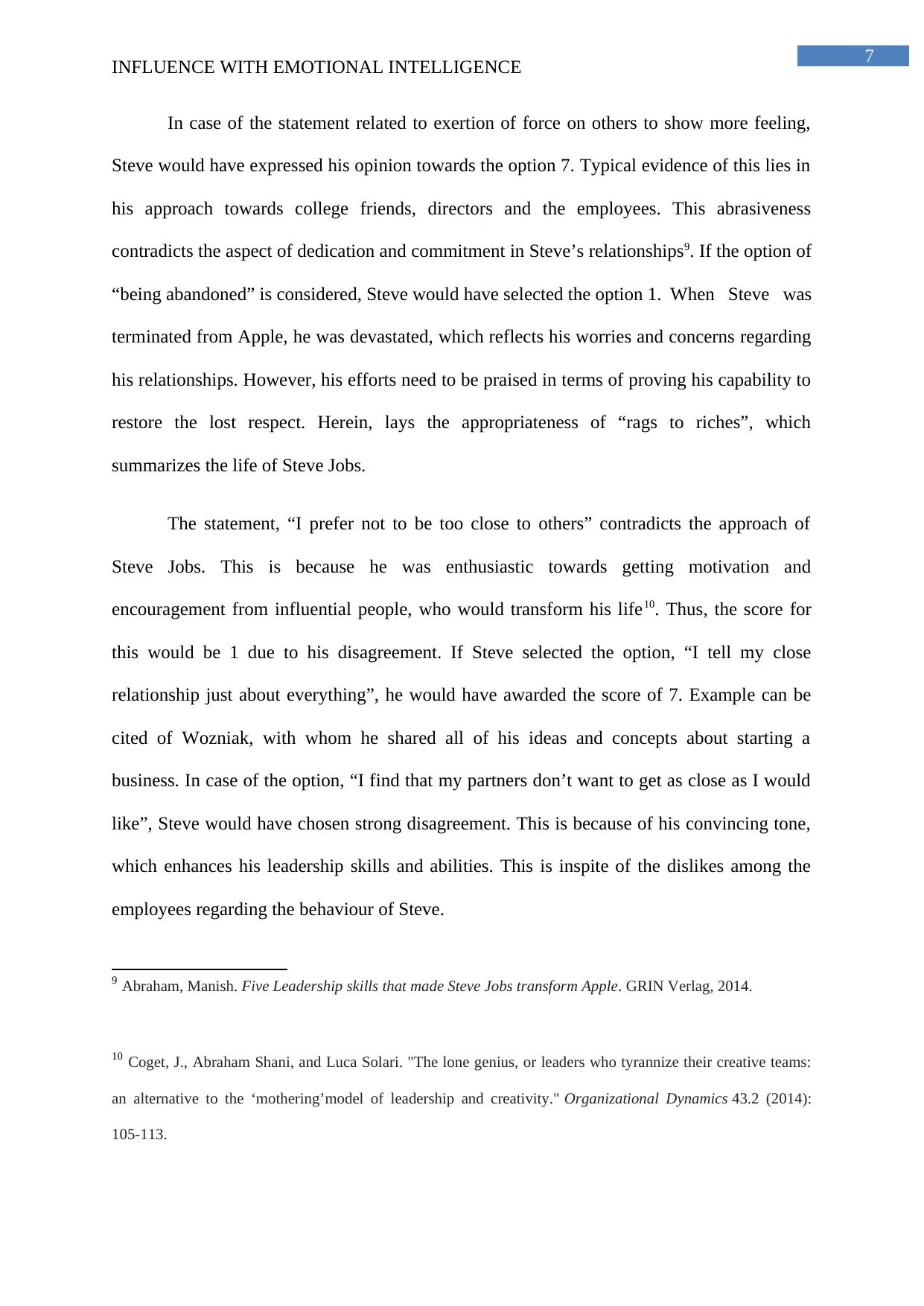
7
INFLUENCE WITH EMOTIONAL INTELLIGENCE
In case of the statement related to exertion of force on others to show more feeling,
Steve would have expressed his opinion towards the option 7. Typical evidence of this lies in
his approach towards college friends, directors and the employees. This abrasiveness
contradicts the aspect of dedication and commitment in Steve’s relationships9. If the option of
“being abandoned” is considered, Steve would have selected the option 1. When Steve was
terminated from Apple, he was devastated, which reflects his worries and concerns regarding
his relationships. However, his efforts need to be praised in terms of proving his capability to
restore the lost respect. Herein, lays the appropriateness of “rags to riches”, which
summarizes the life of Steve Jobs.
The statement, “I prefer not to be too close to others” contradicts the approach of
Steve Jobs. This is because he was enthusiastic towards getting motivation and
encouragement from influential people, who would transform his life10. Thus, the score for
this would be 1 due to his disagreement. If Steve selected the option, “I tell my close
relationship just about everything”, he would have awarded the score of 7. Example can be
cited of Wozniak, with whom he shared all of his ideas and concepts about starting a
business. In case of the option, “I find that my partners don’t want to get as close as I would
like”, Steve would have chosen strong disagreement. This is because of his convincing tone,
which enhances his leadership skills and abilities. This is inspite of the dislikes among the
employees regarding the behaviour of Steve.
9 Abraham, Manish. Five Leadership skills that made Steve Jobs transform Apple. GRIN Verlag, 2014.
10 Coget, J., Abraham Shani, and Luca Solari. "The lone genius, or leaders who tyrannize their creative teams:
an alternative to the ‘mothering’model of leadership and creativity." Organizational Dynamics 43.2 (2014):
105-113.
INFLUENCE WITH EMOTIONAL INTELLIGENCE
In case of the statement related to exertion of force on others to show more feeling,
Steve would have expressed his opinion towards the option 7. Typical evidence of this lies in
his approach towards college friends, directors and the employees. This abrasiveness
contradicts the aspect of dedication and commitment in Steve’s relationships9. If the option of
“being abandoned” is considered, Steve would have selected the option 1. When Steve was
terminated from Apple, he was devastated, which reflects his worries and concerns regarding
his relationships. However, his efforts need to be praised in terms of proving his capability to
restore the lost respect. Herein, lays the appropriateness of “rags to riches”, which
summarizes the life of Steve Jobs.
The statement, “I prefer not to be too close to others” contradicts the approach of
Steve Jobs. This is because he was enthusiastic towards getting motivation and
encouragement from influential people, who would transform his life10. Thus, the score for
this would be 1 due to his disagreement. If Steve selected the option, “I tell my close
relationship just about everything”, he would have awarded the score of 7. Example can be
cited of Wozniak, with whom he shared all of his ideas and concepts about starting a
business. In case of the option, “I find that my partners don’t want to get as close as I would
like”, Steve would have chosen strong disagreement. This is because of his convincing tone,
which enhances his leadership skills and abilities. This is inspite of the dislikes among the
employees regarding the behaviour of Steve.
9 Abraham, Manish. Five Leadership skills that made Steve Jobs transform Apple. GRIN Verlag, 2014.
10 Coget, J., Abraham Shani, and Luca Solari. "The lone genius, or leaders who tyrannize their creative teams:
an alternative to the ‘mothering’model of leadership and creativity." Organizational Dynamics 43.2 (2014):
105-113.
Paraphrase This Document
Need a fresh take? Get an instant paraphrase of this document with our AI Paraphraser
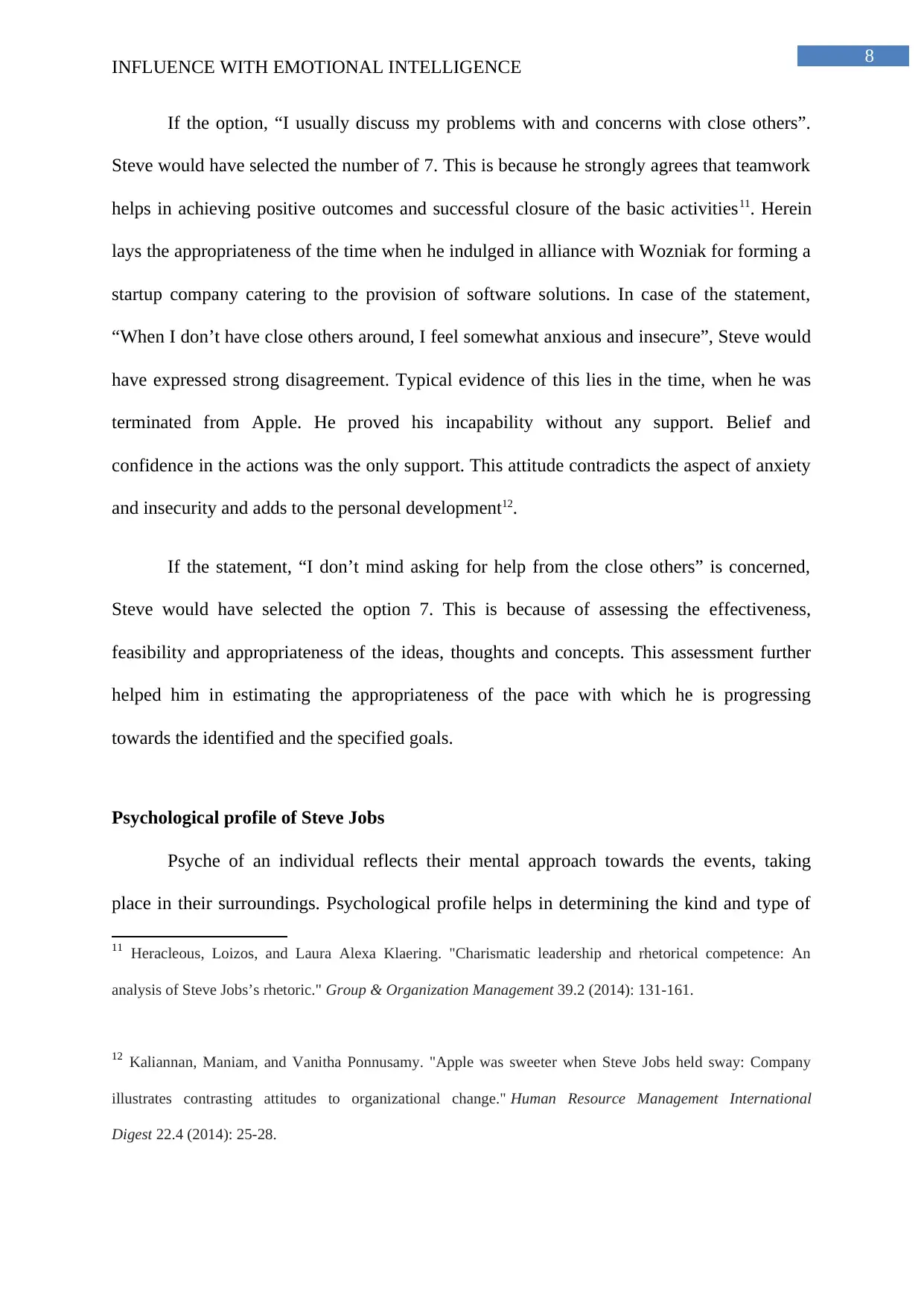
8
INFLUENCE WITH EMOTIONAL INTELLIGENCE
If the option, “I usually discuss my problems with and concerns with close others”.
Steve would have selected the number of 7. This is because he strongly agrees that teamwork
helps in achieving positive outcomes and successful closure of the basic activities11. Herein
lays the appropriateness of the time when he indulged in alliance with Wozniak for forming a
startup company catering to the provision of software solutions. In case of the statement,
“When I don’t have close others around, I feel somewhat anxious and insecure”, Steve would
have expressed strong disagreement. Typical evidence of this lies in the time, when he was
terminated from Apple. He proved his incapability without any support. Belief and
confidence in the actions was the only support. This attitude contradicts the aspect of anxiety
and insecurity and adds to the personal development12.
If the statement, “I don’t mind asking for help from the close others” is concerned,
Steve would have selected the option 7. This is because of assessing the effectiveness,
feasibility and appropriateness of the ideas, thoughts and concepts. This assessment further
helped him in estimating the appropriateness of the pace with which he is progressing
towards the identified and the specified goals.
Psychological profile of Steve Jobs
Psyche of an individual reflects their mental approach towards the events, taking
place in their surroundings. Psychological profile helps in determining the kind and type of
11 Heracleous, Loizos, and Laura Alexa Klaering. "Charismatic leadership and rhetorical competence: An
analysis of Steve Jobs’s rhetoric." Group & Organization Management 39.2 (2014): 131-161.
12 Kaliannan, Maniam, and Vanitha Ponnusamy. "Apple was sweeter when Steve Jobs held sway: Company
illustrates contrasting attitudes to organizational change." Human Resource Management International
Digest 22.4 (2014): 25-28.
INFLUENCE WITH EMOTIONAL INTELLIGENCE
If the option, “I usually discuss my problems with and concerns with close others”.
Steve would have selected the number of 7. This is because he strongly agrees that teamwork
helps in achieving positive outcomes and successful closure of the basic activities11. Herein
lays the appropriateness of the time when he indulged in alliance with Wozniak for forming a
startup company catering to the provision of software solutions. In case of the statement,
“When I don’t have close others around, I feel somewhat anxious and insecure”, Steve would
have expressed strong disagreement. Typical evidence of this lies in the time, when he was
terminated from Apple. He proved his incapability without any support. Belief and
confidence in the actions was the only support. This attitude contradicts the aspect of anxiety
and insecurity and adds to the personal development12.
If the statement, “I don’t mind asking for help from the close others” is concerned,
Steve would have selected the option 7. This is because of assessing the effectiveness,
feasibility and appropriateness of the ideas, thoughts and concepts. This assessment further
helped him in estimating the appropriateness of the pace with which he is progressing
towards the identified and the specified goals.
Psychological profile of Steve Jobs
Psyche of an individual reflects their mental approach towards the events, taking
place in their surroundings. Psychological profile helps in determining the kind and type of
11 Heracleous, Loizos, and Laura Alexa Klaering. "Charismatic leadership and rhetorical competence: An
analysis of Steve Jobs’s rhetoric." Group & Organization Management 39.2 (2014): 131-161.
12 Kaliannan, Maniam, and Vanitha Ponnusamy. "Apple was sweeter when Steve Jobs held sway: Company
illustrates contrasting attitudes to organizational change." Human Resource Management International
Digest 22.4 (2014): 25-28.
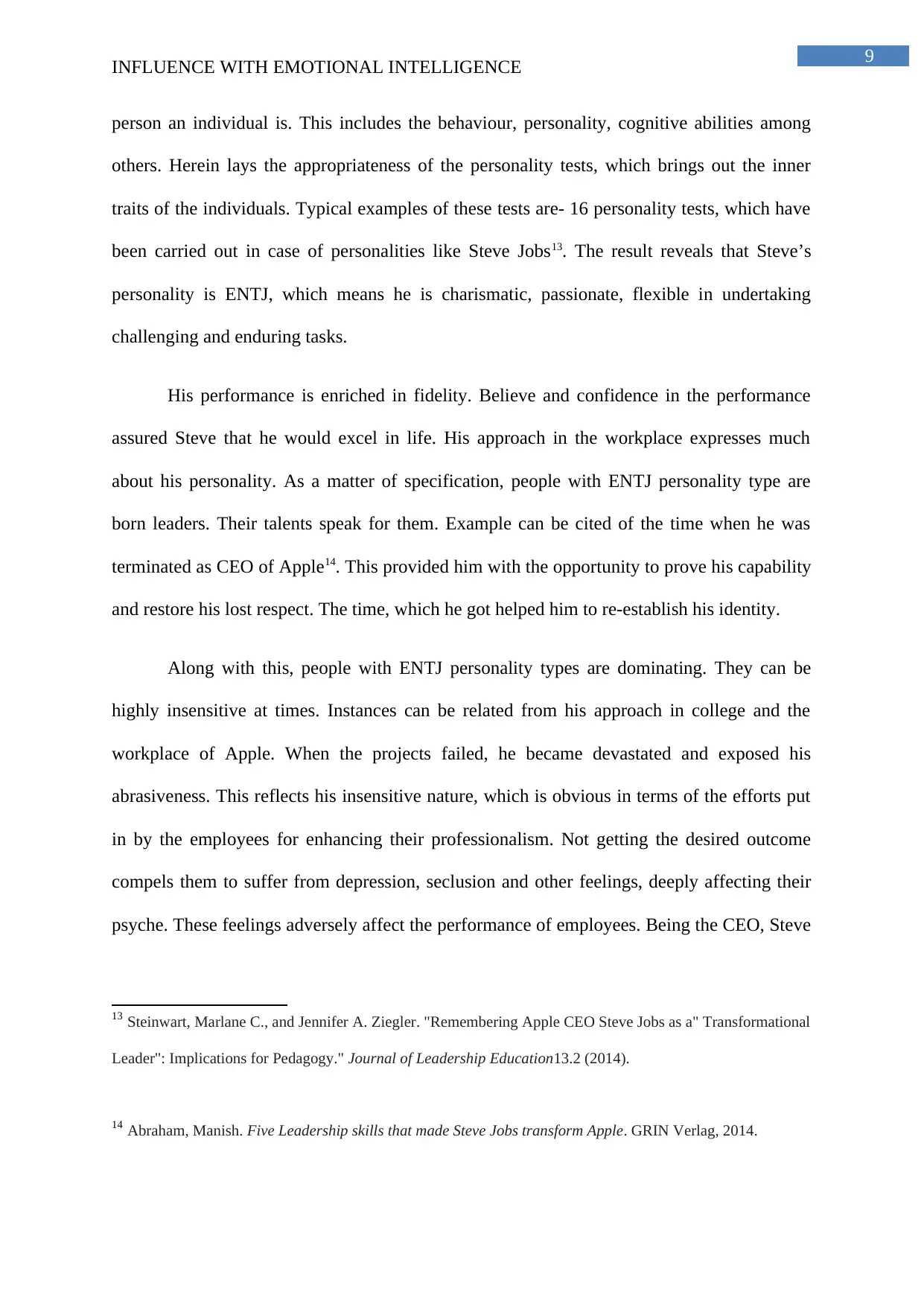
9
INFLUENCE WITH EMOTIONAL INTELLIGENCE
person an individual is. This includes the behaviour, personality, cognitive abilities among
others. Herein lays the appropriateness of the personality tests, which brings out the inner
traits of the individuals. Typical examples of these tests are- 16 personality tests, which have
been carried out in case of personalities like Steve Jobs13. The result reveals that Steve’s
personality is ENTJ, which means he is charismatic, passionate, flexible in undertaking
challenging and enduring tasks.
His performance is enriched in fidelity. Believe and confidence in the performance
assured Steve that he would excel in life. His approach in the workplace expresses much
about his personality. As a matter of specification, people with ENTJ personality type are
born leaders. Their talents speak for them. Example can be cited of the time when he was
terminated as CEO of Apple14. This provided him with the opportunity to prove his capability
and restore his lost respect. The time, which he got helped him to re-establish his identity.
Along with this, people with ENTJ personality types are dominating. They can be
highly insensitive at times. Instances can be related from his approach in college and the
workplace of Apple. When the projects failed, he became devastated and exposed his
abrasiveness. This reflects his insensitive nature, which is obvious in terms of the efforts put
in by the employees for enhancing their professionalism. Not getting the desired outcome
compels them to suffer from depression, seclusion and other feelings, deeply affecting their
psyche. These feelings adversely affect the performance of employees. Being the CEO, Steve
13 Steinwart, Marlane C., and Jennifer A. Ziegler. "Remembering Apple CEO Steve Jobs as a" Transformational
Leader": Implications for Pedagogy." Journal of Leadership Education13.2 (2014).
14 Abraham, Manish. Five Leadership skills that made Steve Jobs transform Apple. GRIN Verlag, 2014.
INFLUENCE WITH EMOTIONAL INTELLIGENCE
person an individual is. This includes the behaviour, personality, cognitive abilities among
others. Herein lays the appropriateness of the personality tests, which brings out the inner
traits of the individuals. Typical examples of these tests are- 16 personality tests, which have
been carried out in case of personalities like Steve Jobs13. The result reveals that Steve’s
personality is ENTJ, which means he is charismatic, passionate, flexible in undertaking
challenging and enduring tasks.
His performance is enriched in fidelity. Believe and confidence in the performance
assured Steve that he would excel in life. His approach in the workplace expresses much
about his personality. As a matter of specification, people with ENTJ personality type are
born leaders. Their talents speak for them. Example can be cited of the time when he was
terminated as CEO of Apple14. This provided him with the opportunity to prove his capability
and restore his lost respect. The time, which he got helped him to re-establish his identity.
Along with this, people with ENTJ personality types are dominating. They can be
highly insensitive at times. Instances can be related from his approach in college and the
workplace of Apple. When the projects failed, he became devastated and exposed his
abrasiveness. This reflects his insensitive nature, which is obvious in terms of the efforts put
in by the employees for enhancing their professionalism. Not getting the desired outcome
compels them to suffer from depression, seclusion and other feelings, deeply affecting their
psyche. These feelings adversely affect the performance of employees. Being the CEO, Steve
13 Steinwart, Marlane C., and Jennifer A. Ziegler. "Remembering Apple CEO Steve Jobs as a" Transformational
Leader": Implications for Pedagogy." Journal of Leadership Education13.2 (2014).
14 Abraham, Manish. Five Leadership skills that made Steve Jobs transform Apple. GRIN Verlag, 2014.
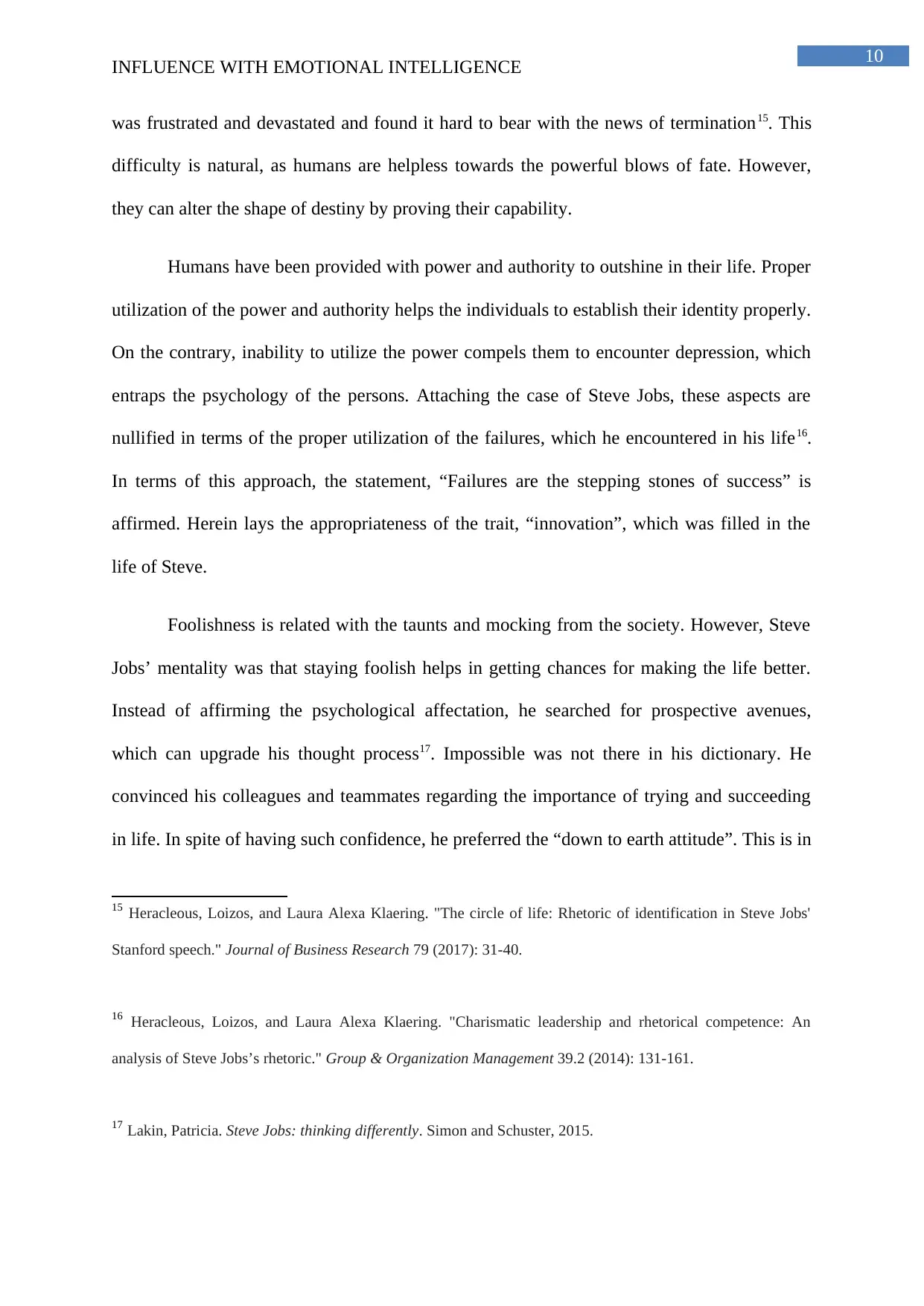
10
INFLUENCE WITH EMOTIONAL INTELLIGENCE
was frustrated and devastated and found it hard to bear with the news of termination15. This
difficulty is natural, as humans are helpless towards the powerful blows of fate. However,
they can alter the shape of destiny by proving their capability.
Humans have been provided with power and authority to outshine in their life. Proper
utilization of the power and authority helps the individuals to establish their identity properly.
On the contrary, inability to utilize the power compels them to encounter depression, which
entraps the psychology of the persons. Attaching the case of Steve Jobs, these aspects are
nullified in terms of the proper utilization of the failures, which he encountered in his life16.
In terms of this approach, the statement, “Failures are the stepping stones of success” is
affirmed. Herein lays the appropriateness of the trait, “innovation”, which was filled in the
life of Steve.
Foolishness is related with the taunts and mocking from the society. However, Steve
Jobs’ mentality was that staying foolish helps in getting chances for making the life better.
Instead of affirming the psychological affectation, he searched for prospective avenues,
which can upgrade his thought process17. Impossible was not there in his dictionary. He
convinced his colleagues and teammates regarding the importance of trying and succeeding
in life. In spite of having such confidence, he preferred the “down to earth attitude”. This is in
15 Heracleous, Loizos, and Laura Alexa Klaering. "The circle of life: Rhetoric of identification in Steve Jobs'
Stanford speech." Journal of Business Research 79 (2017): 31-40.
16 Heracleous, Loizos, and Laura Alexa Klaering. "Charismatic leadership and rhetorical competence: An
analysis of Steve Jobs’s rhetoric." Group & Organization Management 39.2 (2014): 131-161.
17 Lakin, Patricia. Steve Jobs: thinking differently. Simon and Schuster, 2015.
INFLUENCE WITH EMOTIONAL INTELLIGENCE
was frustrated and devastated and found it hard to bear with the news of termination15. This
difficulty is natural, as humans are helpless towards the powerful blows of fate. However,
they can alter the shape of destiny by proving their capability.
Humans have been provided with power and authority to outshine in their life. Proper
utilization of the power and authority helps the individuals to establish their identity properly.
On the contrary, inability to utilize the power compels them to encounter depression, which
entraps the psychology of the persons. Attaching the case of Steve Jobs, these aspects are
nullified in terms of the proper utilization of the failures, which he encountered in his life16.
In terms of this approach, the statement, “Failures are the stepping stones of success” is
affirmed. Herein lays the appropriateness of the trait, “innovation”, which was filled in the
life of Steve.
Foolishness is related with the taunts and mocking from the society. However, Steve
Jobs’ mentality was that staying foolish helps in getting chances for making the life better.
Instead of affirming the psychological affectation, he searched for prospective avenues,
which can upgrade his thought process17. Impossible was not there in his dictionary. He
convinced his colleagues and teammates regarding the importance of trying and succeeding
in life. In spite of having such confidence, he preferred the “down to earth attitude”. This is in
15 Heracleous, Loizos, and Laura Alexa Klaering. "The circle of life: Rhetoric of identification in Steve Jobs'
Stanford speech." Journal of Business Research 79 (2017): 31-40.
16 Heracleous, Loizos, and Laura Alexa Klaering. "Charismatic leadership and rhetorical competence: An
analysis of Steve Jobs’s rhetoric." Group & Organization Management 39.2 (2014): 131-161.
17 Lakin, Patricia. Steve Jobs: thinking differently. Simon and Schuster, 2015.
Secure Best Marks with AI Grader
Need help grading? Try our AI Grader for instant feedback on your assignments.
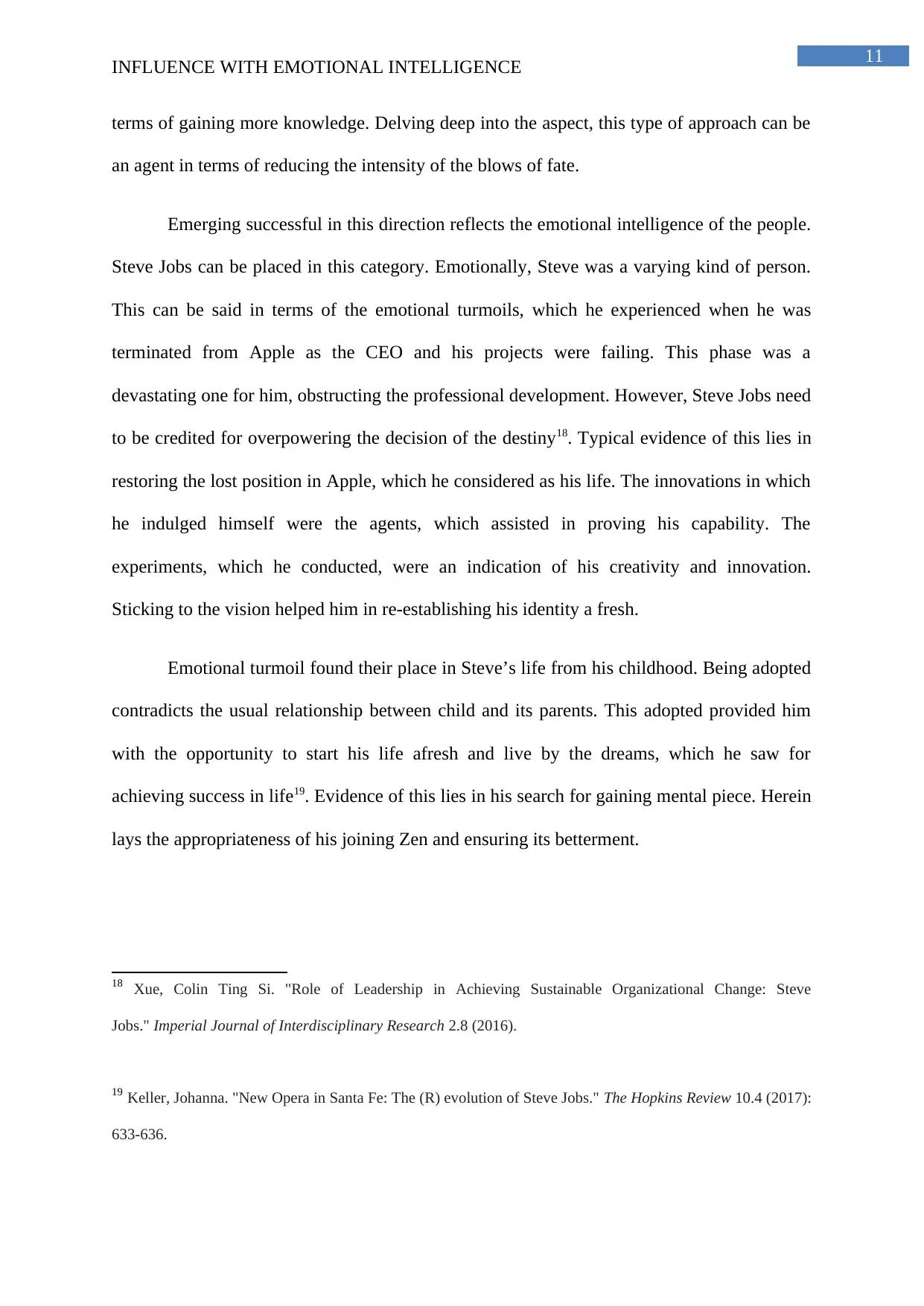
11
INFLUENCE WITH EMOTIONAL INTELLIGENCE
terms of gaining more knowledge. Delving deep into the aspect, this type of approach can be
an agent in terms of reducing the intensity of the blows of fate.
Emerging successful in this direction reflects the emotional intelligence of the people.
Steve Jobs can be placed in this category. Emotionally, Steve was a varying kind of person.
This can be said in terms of the emotional turmoils, which he experienced when he was
terminated from Apple as the CEO and his projects were failing. This phase was a
devastating one for him, obstructing the professional development. However, Steve Jobs need
to be credited for overpowering the decision of the destiny18. Typical evidence of this lies in
restoring the lost position in Apple, which he considered as his life. The innovations in which
he indulged himself were the agents, which assisted in proving his capability. The
experiments, which he conducted, were an indication of his creativity and innovation.
Sticking to the vision helped him in re-establishing his identity a fresh.
Emotional turmoil found their place in Steve’s life from his childhood. Being adopted
contradicts the usual relationship between child and its parents. This adopted provided him
with the opportunity to start his life afresh and live by the dreams, which he saw for
achieving success in life19. Evidence of this lies in his search for gaining mental piece. Herein
lays the appropriateness of his joining Zen and ensuring its betterment.
18 Xue, Colin Ting Si. "Role of Leadership in Achieving Sustainable Organizational Change: Steve
Jobs." Imperial Journal of Interdisciplinary Research 2.8 (2016).
19 Keller, Johanna. "New Opera in Santa Fe: The (R) evolution of Steve Jobs." The Hopkins Review 10.4 (2017):
633-636.
INFLUENCE WITH EMOTIONAL INTELLIGENCE
terms of gaining more knowledge. Delving deep into the aspect, this type of approach can be
an agent in terms of reducing the intensity of the blows of fate.
Emerging successful in this direction reflects the emotional intelligence of the people.
Steve Jobs can be placed in this category. Emotionally, Steve was a varying kind of person.
This can be said in terms of the emotional turmoils, which he experienced when he was
terminated from Apple as the CEO and his projects were failing. This phase was a
devastating one for him, obstructing the professional development. However, Steve Jobs need
to be credited for overpowering the decision of the destiny18. Typical evidence of this lies in
restoring the lost position in Apple, which he considered as his life. The innovations in which
he indulged himself were the agents, which assisted in proving his capability. The
experiments, which he conducted, were an indication of his creativity and innovation.
Sticking to the vision helped him in re-establishing his identity a fresh.
Emotional turmoil found their place in Steve’s life from his childhood. Being adopted
contradicts the usual relationship between child and its parents. This adopted provided him
with the opportunity to start his life afresh and live by the dreams, which he saw for
achieving success in life19. Evidence of this lies in his search for gaining mental piece. Herein
lays the appropriateness of his joining Zen and ensuring its betterment.
18 Xue, Colin Ting Si. "Role of Leadership in Achieving Sustainable Organizational Change: Steve
Jobs." Imperial Journal of Interdisciplinary Research 2.8 (2016).
19 Keller, Johanna. "New Opera in Santa Fe: The (R) evolution of Steve Jobs." The Hopkins Review 10.4 (2017):
633-636.
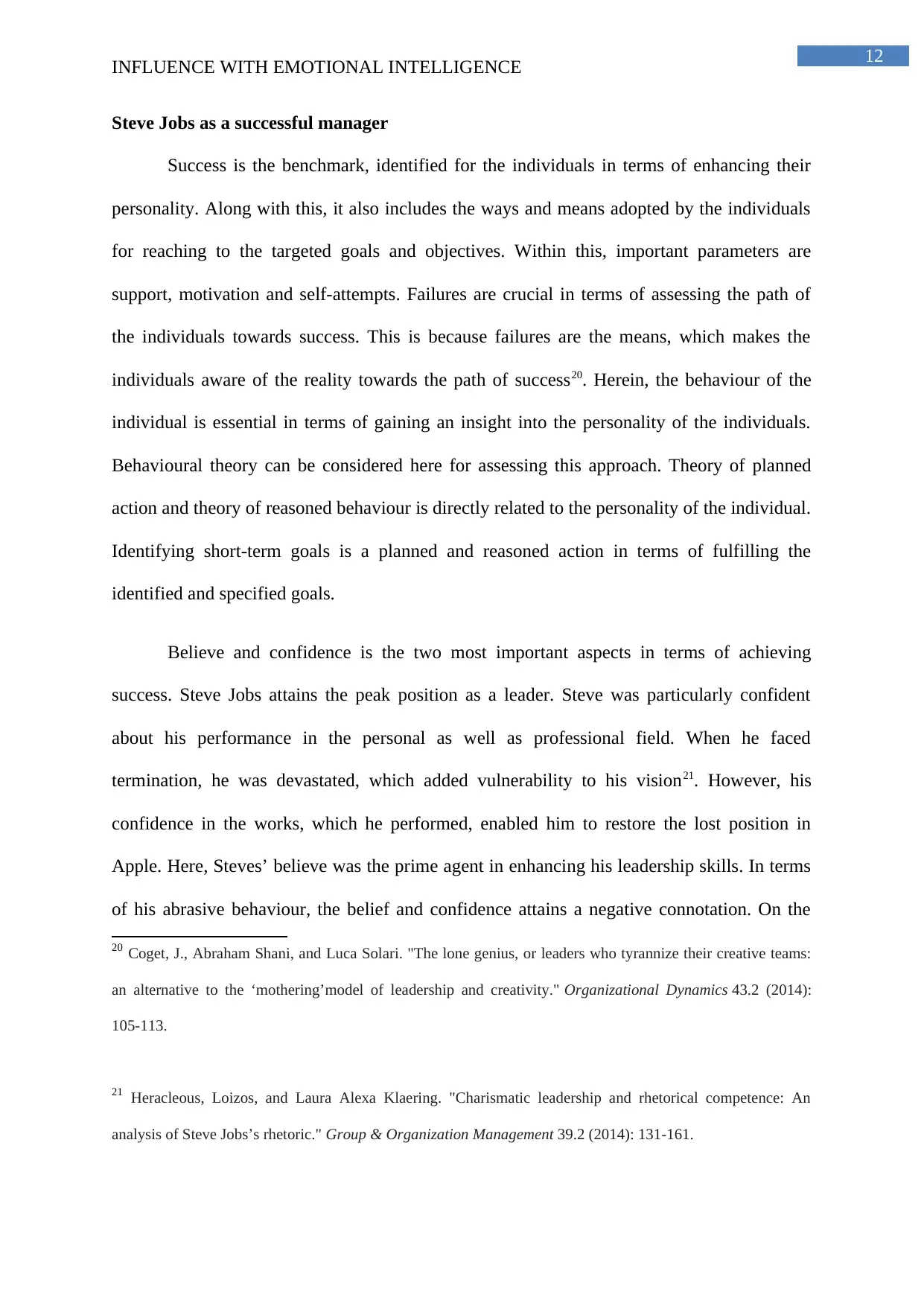
12
INFLUENCE WITH EMOTIONAL INTELLIGENCE
Steve Jobs as a successful manager
Success is the benchmark, identified for the individuals in terms of enhancing their
personality. Along with this, it also includes the ways and means adopted by the individuals
for reaching to the targeted goals and objectives. Within this, important parameters are
support, motivation and self-attempts. Failures are crucial in terms of assessing the path of
the individuals towards success. This is because failures are the means, which makes the
individuals aware of the reality towards the path of success20. Herein, the behaviour of the
individual is essential in terms of gaining an insight into the personality of the individuals.
Behavioural theory can be considered here for assessing this approach. Theory of planned
action and theory of reasoned behaviour is directly related to the personality of the individual.
Identifying short-term goals is a planned and reasoned action in terms of fulfilling the
identified and specified goals.
Believe and confidence is the two most important aspects in terms of achieving
success. Steve Jobs attains the peak position as a leader. Steve was particularly confident
about his performance in the personal as well as professional field. When he faced
termination, he was devastated, which added vulnerability to his vision21. However, his
confidence in the works, which he performed, enabled him to restore the lost position in
Apple. Here, Steves’ believe was the prime agent in enhancing his leadership skills. In terms
of his abrasive behaviour, the belief and confidence attains a negative connotation. On the
20 Coget, J., Abraham Shani, and Luca Solari. "The lone genius, or leaders who tyrannize their creative teams:
an alternative to the ‘mothering’model of leadership and creativity." Organizational Dynamics 43.2 (2014):
105-113.
21 Heracleous, Loizos, and Laura Alexa Klaering. "Charismatic leadership and rhetorical competence: An
analysis of Steve Jobs’s rhetoric." Group & Organization Management 39.2 (2014): 131-161.
INFLUENCE WITH EMOTIONAL INTELLIGENCE
Steve Jobs as a successful manager
Success is the benchmark, identified for the individuals in terms of enhancing their
personality. Along with this, it also includes the ways and means adopted by the individuals
for reaching to the targeted goals and objectives. Within this, important parameters are
support, motivation and self-attempts. Failures are crucial in terms of assessing the path of
the individuals towards success. This is because failures are the means, which makes the
individuals aware of the reality towards the path of success20. Herein, the behaviour of the
individual is essential in terms of gaining an insight into the personality of the individuals.
Behavioural theory can be considered here for assessing this approach. Theory of planned
action and theory of reasoned behaviour is directly related to the personality of the individual.
Identifying short-term goals is a planned and reasoned action in terms of fulfilling the
identified and specified goals.
Believe and confidence is the two most important aspects in terms of achieving
success. Steve Jobs attains the peak position as a leader. Steve was particularly confident
about his performance in the personal as well as professional field. When he faced
termination, he was devastated, which added vulnerability to his vision21. However, his
confidence in the works, which he performed, enabled him to restore the lost position in
Apple. Here, Steves’ believe was the prime agent in enhancing his leadership skills. In terms
of his abrasive behaviour, the belief and confidence attains a negative connotation. On the
20 Coget, J., Abraham Shani, and Luca Solari. "The lone genius, or leaders who tyrannize their creative teams:
an alternative to the ‘mothering’model of leadership and creativity." Organizational Dynamics 43.2 (2014):
105-113.
21 Heracleous, Loizos, and Laura Alexa Klaering. "Charismatic leadership and rhetorical competence: An
analysis of Steve Jobs’s rhetoric." Group & Organization Management 39.2 (2014): 131-161.
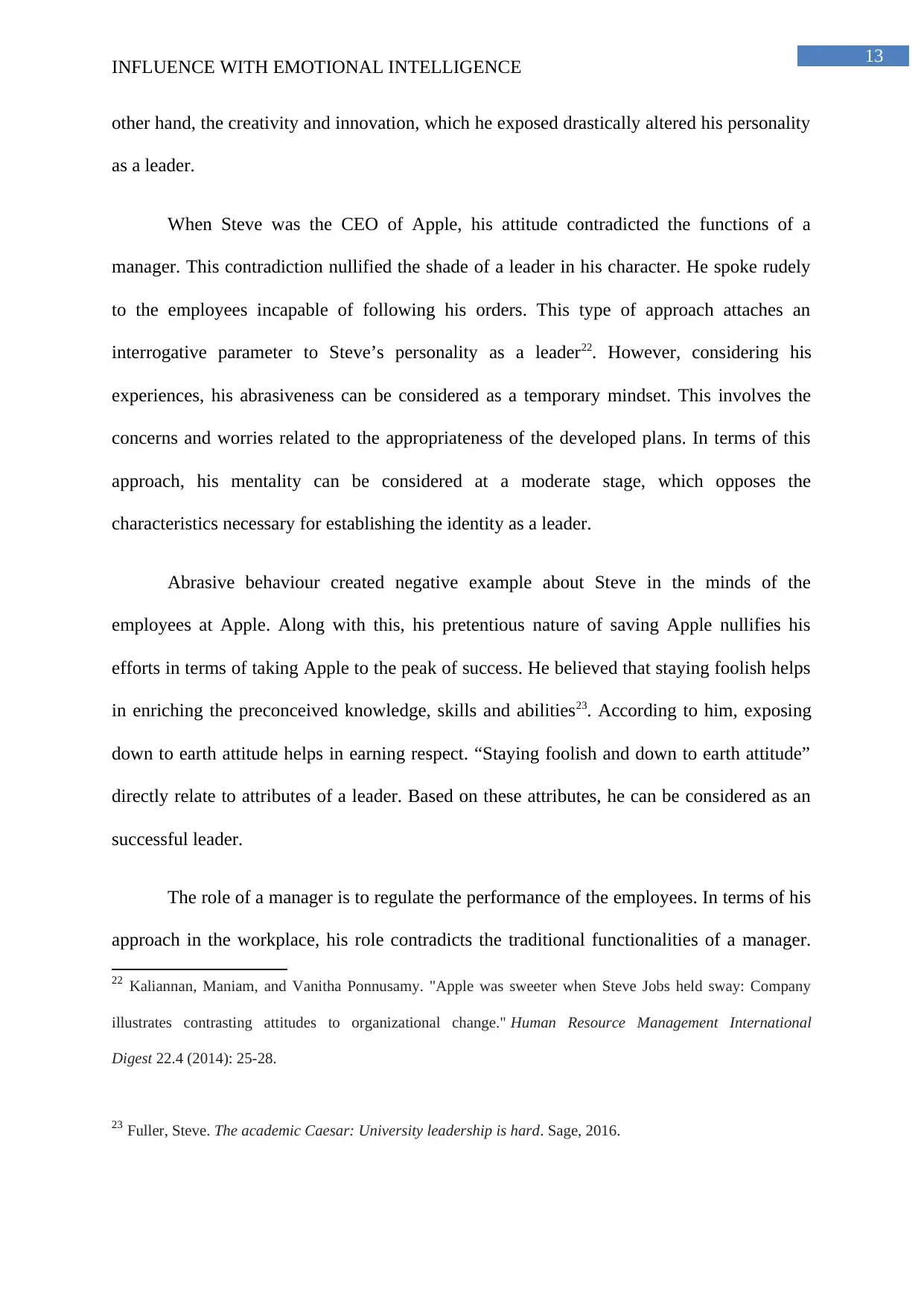
13
INFLUENCE WITH EMOTIONAL INTELLIGENCE
other hand, the creativity and innovation, which he exposed drastically altered his personality
as a leader.
When Steve was the CEO of Apple, his attitude contradicted the functions of a
manager. This contradiction nullified the shade of a leader in his character. He spoke rudely
to the employees incapable of following his orders. This type of approach attaches an
interrogative parameter to Steve’s personality as a leader22. However, considering his
experiences, his abrasiveness can be considered as a temporary mindset. This involves the
concerns and worries related to the appropriateness of the developed plans. In terms of this
approach, his mentality can be considered at a moderate stage, which opposes the
characteristics necessary for establishing the identity as a leader.
Abrasive behaviour created negative example about Steve in the minds of the
employees at Apple. Along with this, his pretentious nature of saving Apple nullifies his
efforts in terms of taking Apple to the peak of success. He believed that staying foolish helps
in enriching the preconceived knowledge, skills and abilities23. According to him, exposing
down to earth attitude helps in earning respect. “Staying foolish and down to earth attitude”
directly relate to attributes of a leader. Based on these attributes, he can be considered as an
successful leader.
The role of a manager is to regulate the performance of the employees. In terms of his
approach in the workplace, his role contradicts the traditional functionalities of a manager.
22 Kaliannan, Maniam, and Vanitha Ponnusamy. "Apple was sweeter when Steve Jobs held sway: Company
illustrates contrasting attitudes to organizational change." Human Resource Management International
Digest 22.4 (2014): 25-28.
23 Fuller, Steve. The academic Caesar: University leadership is hard. Sage, 2016.
INFLUENCE WITH EMOTIONAL INTELLIGENCE
other hand, the creativity and innovation, which he exposed drastically altered his personality
as a leader.
When Steve was the CEO of Apple, his attitude contradicted the functions of a
manager. This contradiction nullified the shade of a leader in his character. He spoke rudely
to the employees incapable of following his orders. This type of approach attaches an
interrogative parameter to Steve’s personality as a leader22. However, considering his
experiences, his abrasiveness can be considered as a temporary mindset. This involves the
concerns and worries related to the appropriateness of the developed plans. In terms of this
approach, his mentality can be considered at a moderate stage, which opposes the
characteristics necessary for establishing the identity as a leader.
Abrasive behaviour created negative example about Steve in the minds of the
employees at Apple. Along with this, his pretentious nature of saving Apple nullifies his
efforts in terms of taking Apple to the peak of success. He believed that staying foolish helps
in enriching the preconceived knowledge, skills and abilities23. According to him, exposing
down to earth attitude helps in earning respect. “Staying foolish and down to earth attitude”
directly relate to attributes of a leader. Based on these attributes, he can be considered as an
successful leader.
The role of a manager is to regulate the performance of the employees. In terms of his
approach in the workplace, his role contradicts the traditional functionalities of a manager.
22 Kaliannan, Maniam, and Vanitha Ponnusamy. "Apple was sweeter when Steve Jobs held sway: Company
illustrates contrasting attitudes to organizational change." Human Resource Management International
Digest 22.4 (2014): 25-28.
23 Fuller, Steve. The academic Caesar: University leadership is hard. Sage, 2016.
Paraphrase This Document
Need a fresh take? Get an instant paraphrase of this document with our AI Paraphraser
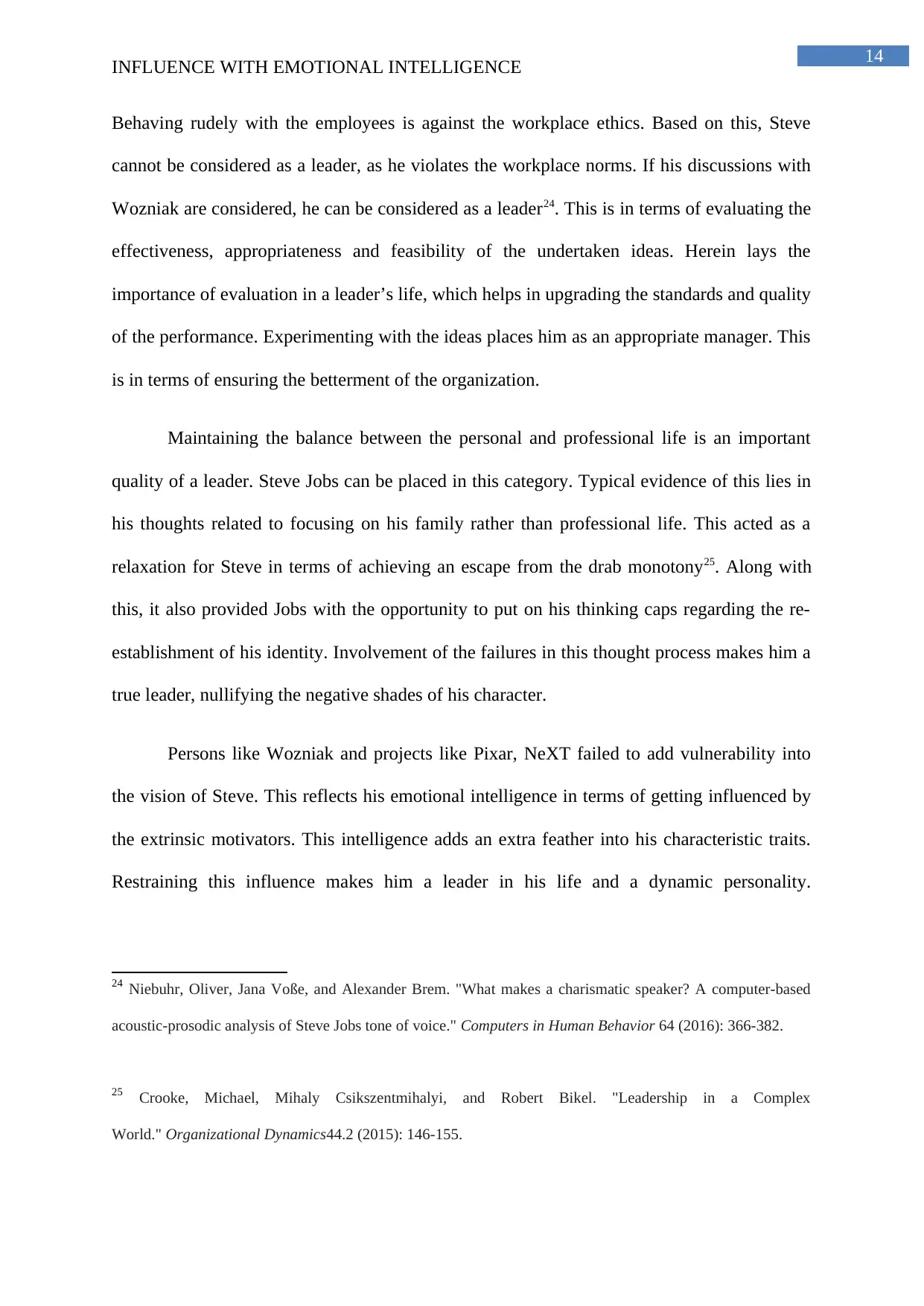
14
INFLUENCE WITH EMOTIONAL INTELLIGENCE
Behaving rudely with the employees is against the workplace ethics. Based on this, Steve
cannot be considered as a leader, as he violates the workplace norms. If his discussions with
Wozniak are considered, he can be considered as a leader24. This is in terms of evaluating the
effectiveness, appropriateness and feasibility of the undertaken ideas. Herein lays the
importance of evaluation in a leader’s life, which helps in upgrading the standards and quality
of the performance. Experimenting with the ideas places him as an appropriate manager. This
is in terms of ensuring the betterment of the organization.
Maintaining the balance between the personal and professional life is an important
quality of a leader. Steve Jobs can be placed in this category. Typical evidence of this lies in
his thoughts related to focusing on his family rather than professional life. This acted as a
relaxation for Steve in terms of achieving an escape from the drab monotony25. Along with
this, it also provided Jobs with the opportunity to put on his thinking caps regarding the re-
establishment of his identity. Involvement of the failures in this thought process makes him a
true leader, nullifying the negative shades of his character.
Persons like Wozniak and projects like Pixar, NeXT failed to add vulnerability into
the vision of Steve. This reflects his emotional intelligence in terms of getting influenced by
the extrinsic motivators. This intelligence adds an extra feather into his characteristic traits.
Restraining this influence makes him a leader in his life and a dynamic personality.
24 Niebuhr, Oliver, Jana Voße, and Alexander Brem. "What makes a charismatic speaker? A computer-based
acoustic-prosodic analysis of Steve Jobs tone of voice." Computers in Human Behavior 64 (2016): 366-382.
25 Crooke, Michael, Mihaly Csikszentmihalyi, and Robert Bikel. "Leadership in a Complex
World." Organizational Dynamics44.2 (2015): 146-155.
INFLUENCE WITH EMOTIONAL INTELLIGENCE
Behaving rudely with the employees is against the workplace ethics. Based on this, Steve
cannot be considered as a leader, as he violates the workplace norms. If his discussions with
Wozniak are considered, he can be considered as a leader24. This is in terms of evaluating the
effectiveness, appropriateness and feasibility of the undertaken ideas. Herein lays the
importance of evaluation in a leader’s life, which helps in upgrading the standards and quality
of the performance. Experimenting with the ideas places him as an appropriate manager. This
is in terms of ensuring the betterment of the organization.
Maintaining the balance between the personal and professional life is an important
quality of a leader. Steve Jobs can be placed in this category. Typical evidence of this lies in
his thoughts related to focusing on his family rather than professional life. This acted as a
relaxation for Steve in terms of achieving an escape from the drab monotony25. Along with
this, it also provided Jobs with the opportunity to put on his thinking caps regarding the re-
establishment of his identity. Involvement of the failures in this thought process makes him a
true leader, nullifying the negative shades of his character.
Persons like Wozniak and projects like Pixar, NeXT failed to add vulnerability into
the vision of Steve. This reflects his emotional intelligence in terms of getting influenced by
the extrinsic motivators. This intelligence adds an extra feather into his characteristic traits.
Restraining this influence makes him a leader in his life and a dynamic personality.
24 Niebuhr, Oliver, Jana Voße, and Alexander Brem. "What makes a charismatic speaker? A computer-based
acoustic-prosodic analysis of Steve Jobs tone of voice." Computers in Human Behavior 64 (2016): 366-382.
25 Crooke, Michael, Mihaly Csikszentmihalyi, and Robert Bikel. "Leadership in a Complex
World." Organizational Dynamics44.2 (2015): 146-155.
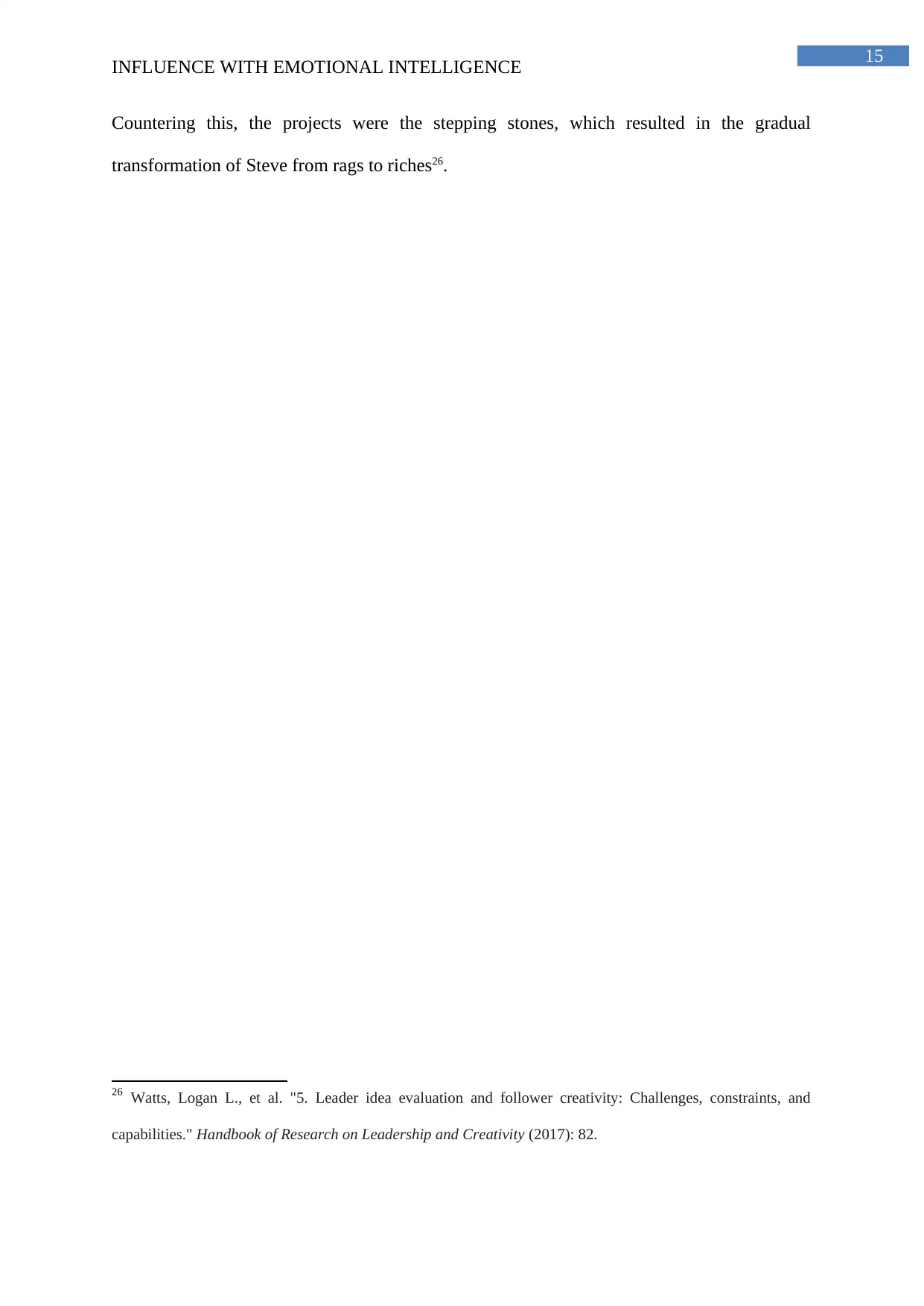
15
INFLUENCE WITH EMOTIONAL INTELLIGENCE
Countering this, the projects were the stepping stones, which resulted in the gradual
transformation of Steve from rags to riches26.
26 Watts, Logan L., et al. "5. Leader idea evaluation and follower creativity: Challenges, constraints, and
capabilities." Handbook of Research on Leadership and Creativity (2017): 82.
INFLUENCE WITH EMOTIONAL INTELLIGENCE
Countering this, the projects were the stepping stones, which resulted in the gradual
transformation of Steve from rags to riches26.
26 Watts, Logan L., et al. "5. Leader idea evaluation and follower creativity: Challenges, constraints, and
capabilities." Handbook of Research on Leadership and Creativity (2017): 82.
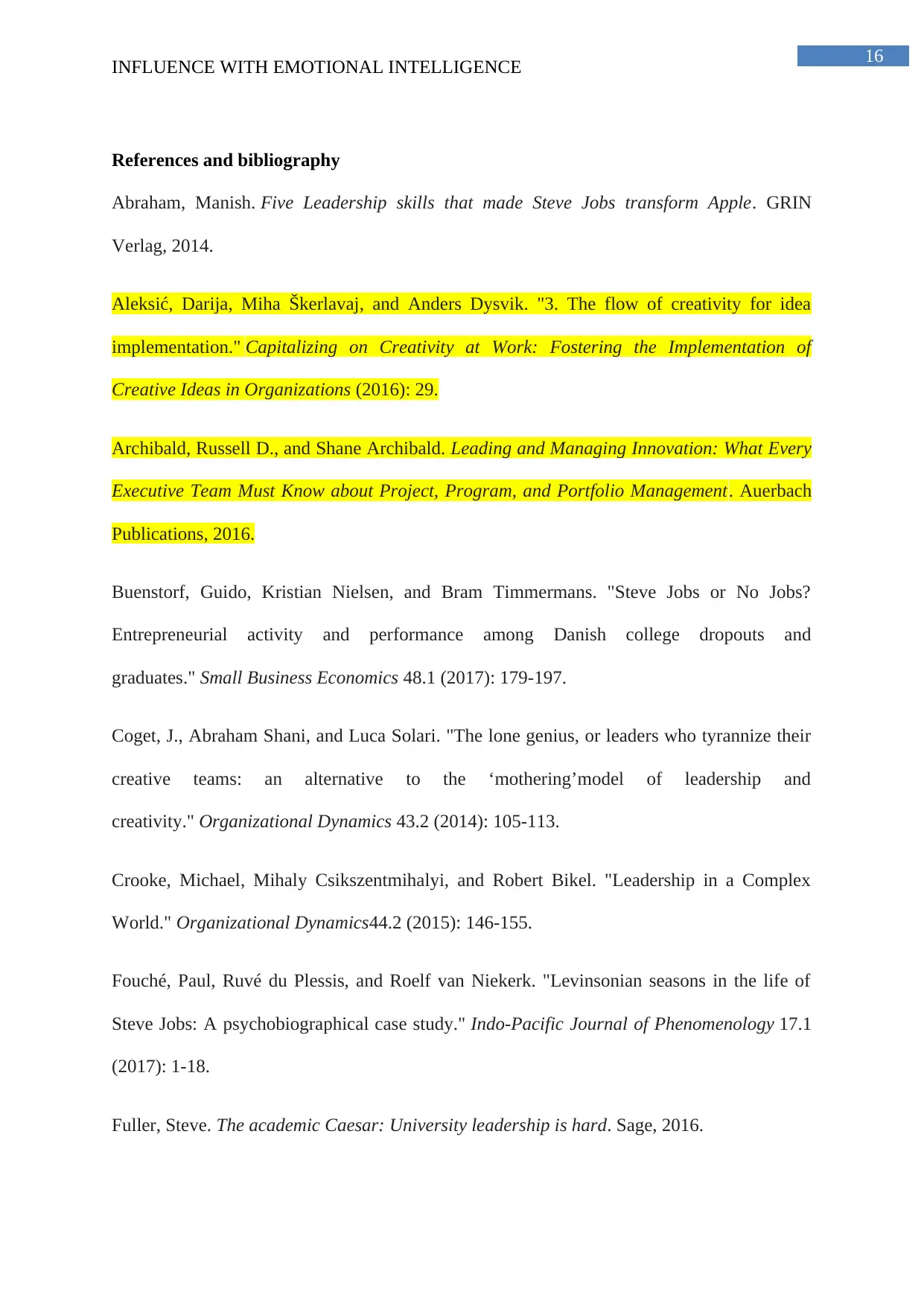
16
INFLUENCE WITH EMOTIONAL INTELLIGENCE
References and bibliography
Abraham, Manish. Five Leadership skills that made Steve Jobs transform Apple. GRIN
Verlag, 2014.
Aleksić, Darija, Miha Škerlavaj, and Anders Dysvik. "3. The flow of creativity for idea
implementation." Capitalizing on Creativity at Work: Fostering the Implementation of
Creative Ideas in Organizations (2016): 29.
Archibald, Russell D., and Shane Archibald. Leading and Managing Innovation: What Every
Executive Team Must Know about Project, Program, and Portfolio Management. Auerbach
Publications, 2016.
Buenstorf, Guido, Kristian Nielsen, and Bram Timmermans. "Steve Jobs or No Jobs?
Entrepreneurial activity and performance among Danish college dropouts and
graduates." Small Business Economics 48.1 (2017): 179-197.
Coget, J., Abraham Shani, and Luca Solari. "The lone genius, or leaders who tyrannize their
creative teams: an alternative to the ‘mothering’model of leadership and
creativity." Organizational Dynamics 43.2 (2014): 105-113.
Crooke, Michael, Mihaly Csikszentmihalyi, and Robert Bikel. "Leadership in a Complex
World." Organizational Dynamics44.2 (2015): 146-155.
Fouché, Paul, Ruvé du Plessis, and Roelf van Niekerk. "Levinsonian seasons in the life of
Steve Jobs: A psychobiographical case study." Indo-Pacific Journal of Phenomenology 17.1
(2017): 1-18.
Fuller, Steve. The academic Caesar: University leadership is hard. Sage, 2016.
INFLUENCE WITH EMOTIONAL INTELLIGENCE
References and bibliography
Abraham, Manish. Five Leadership skills that made Steve Jobs transform Apple. GRIN
Verlag, 2014.
Aleksić, Darija, Miha Škerlavaj, and Anders Dysvik. "3. The flow of creativity for idea
implementation." Capitalizing on Creativity at Work: Fostering the Implementation of
Creative Ideas in Organizations (2016): 29.
Archibald, Russell D., and Shane Archibald. Leading and Managing Innovation: What Every
Executive Team Must Know about Project, Program, and Portfolio Management. Auerbach
Publications, 2016.
Buenstorf, Guido, Kristian Nielsen, and Bram Timmermans. "Steve Jobs or No Jobs?
Entrepreneurial activity and performance among Danish college dropouts and
graduates." Small Business Economics 48.1 (2017): 179-197.
Coget, J., Abraham Shani, and Luca Solari. "The lone genius, or leaders who tyrannize their
creative teams: an alternative to the ‘mothering’model of leadership and
creativity." Organizational Dynamics 43.2 (2014): 105-113.
Crooke, Michael, Mihaly Csikszentmihalyi, and Robert Bikel. "Leadership in a Complex
World." Organizational Dynamics44.2 (2015): 146-155.
Fouché, Paul, Ruvé du Plessis, and Roelf van Niekerk. "Levinsonian seasons in the life of
Steve Jobs: A psychobiographical case study." Indo-Pacific Journal of Phenomenology 17.1
(2017): 1-18.
Fuller, Steve. The academic Caesar: University leadership is hard. Sage, 2016.
Secure Best Marks with AI Grader
Need help grading? Try our AI Grader for instant feedback on your assignments.
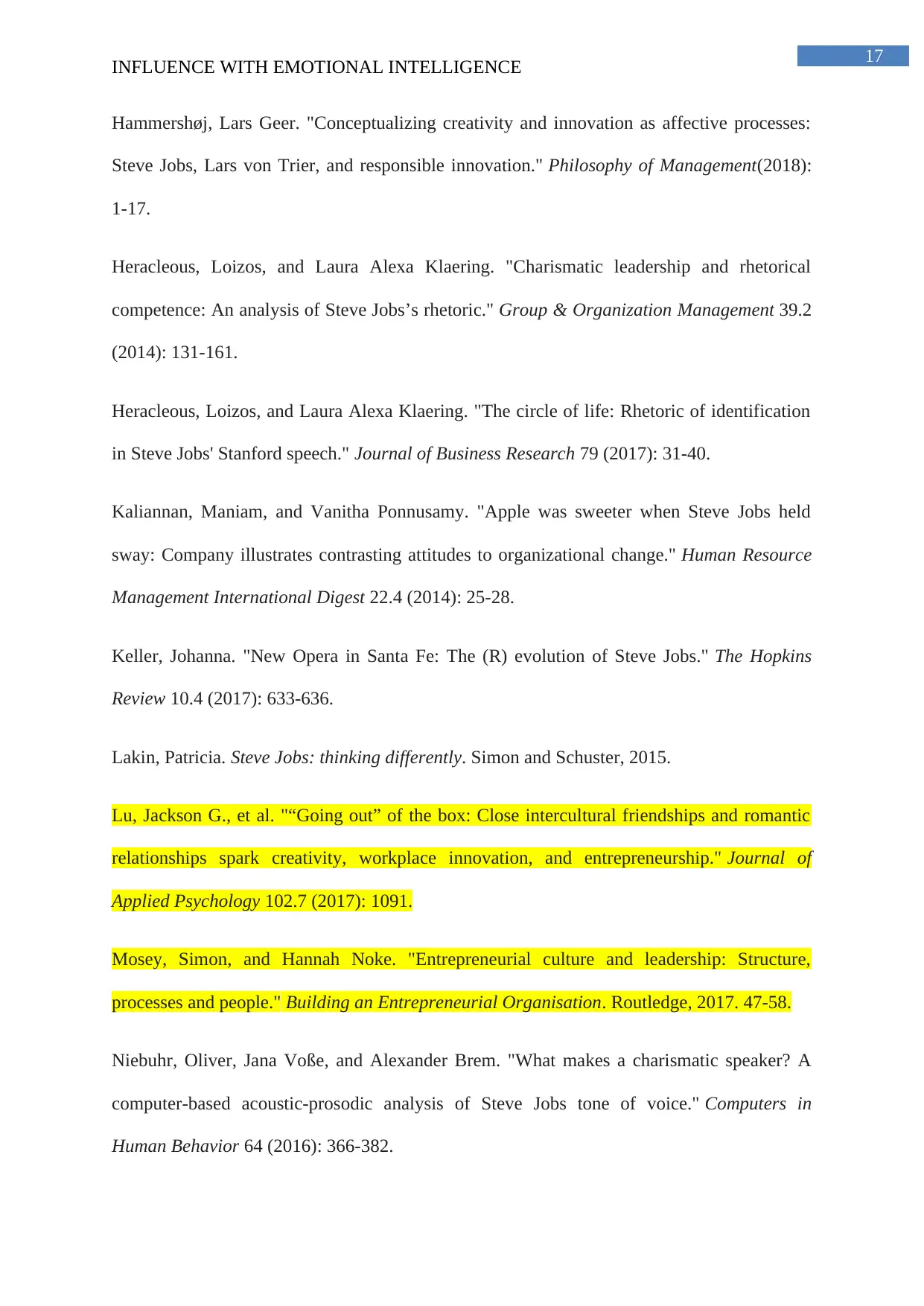
17
INFLUENCE WITH EMOTIONAL INTELLIGENCE
Hammershøj, Lars Geer. "Conceptualizing creativity and innovation as affective processes:
Steve Jobs, Lars von Trier, and responsible innovation." Philosophy of Management(2018):
1-17.
Heracleous, Loizos, and Laura Alexa Klaering. "Charismatic leadership and rhetorical
competence: An analysis of Steve Jobs’s rhetoric." Group & Organization Management 39.2
(2014): 131-161.
Heracleous, Loizos, and Laura Alexa Klaering. "The circle of life: Rhetoric of identification
in Steve Jobs' Stanford speech." Journal of Business Research 79 (2017): 31-40.
Kaliannan, Maniam, and Vanitha Ponnusamy. "Apple was sweeter when Steve Jobs held
sway: Company illustrates contrasting attitudes to organizational change." Human Resource
Management International Digest 22.4 (2014): 25-28.
Keller, Johanna. "New Opera in Santa Fe: The (R) evolution of Steve Jobs." The Hopkins
Review 10.4 (2017): 633-636.
Lakin, Patricia. Steve Jobs: thinking differently. Simon and Schuster, 2015.
Lu, Jackson G., et al. "“Going out” of the box: Close intercultural friendships and romantic
relationships spark creativity, workplace innovation, and entrepreneurship." Journal of
Applied Psychology 102.7 (2017): 1091.
Mosey, Simon, and Hannah Noke. "Entrepreneurial culture and leadership: Structure,
processes and people." Building an Entrepreneurial Organisation. Routledge, 2017. 47-58.
Niebuhr, Oliver, Jana Voße, and Alexander Brem. "What makes a charismatic speaker? A
computer-based acoustic-prosodic analysis of Steve Jobs tone of voice." Computers in
Human Behavior 64 (2016): 366-382.
INFLUENCE WITH EMOTIONAL INTELLIGENCE
Hammershøj, Lars Geer. "Conceptualizing creativity and innovation as affective processes:
Steve Jobs, Lars von Trier, and responsible innovation." Philosophy of Management(2018):
1-17.
Heracleous, Loizos, and Laura Alexa Klaering. "Charismatic leadership and rhetorical
competence: An analysis of Steve Jobs’s rhetoric." Group & Organization Management 39.2
(2014): 131-161.
Heracleous, Loizos, and Laura Alexa Klaering. "The circle of life: Rhetoric of identification
in Steve Jobs' Stanford speech." Journal of Business Research 79 (2017): 31-40.
Kaliannan, Maniam, and Vanitha Ponnusamy. "Apple was sweeter when Steve Jobs held
sway: Company illustrates contrasting attitudes to organizational change." Human Resource
Management International Digest 22.4 (2014): 25-28.
Keller, Johanna. "New Opera in Santa Fe: The (R) evolution of Steve Jobs." The Hopkins
Review 10.4 (2017): 633-636.
Lakin, Patricia. Steve Jobs: thinking differently. Simon and Schuster, 2015.
Lu, Jackson G., et al. "“Going out” of the box: Close intercultural friendships and romantic
relationships spark creativity, workplace innovation, and entrepreneurship." Journal of
Applied Psychology 102.7 (2017): 1091.
Mosey, Simon, and Hannah Noke. "Entrepreneurial culture and leadership: Structure,
processes and people." Building an Entrepreneurial Organisation. Routledge, 2017. 47-58.
Niebuhr, Oliver, Jana Voße, and Alexander Brem. "What makes a charismatic speaker? A
computer-based acoustic-prosodic analysis of Steve Jobs tone of voice." Computers in
Human Behavior 64 (2016): 366-382.
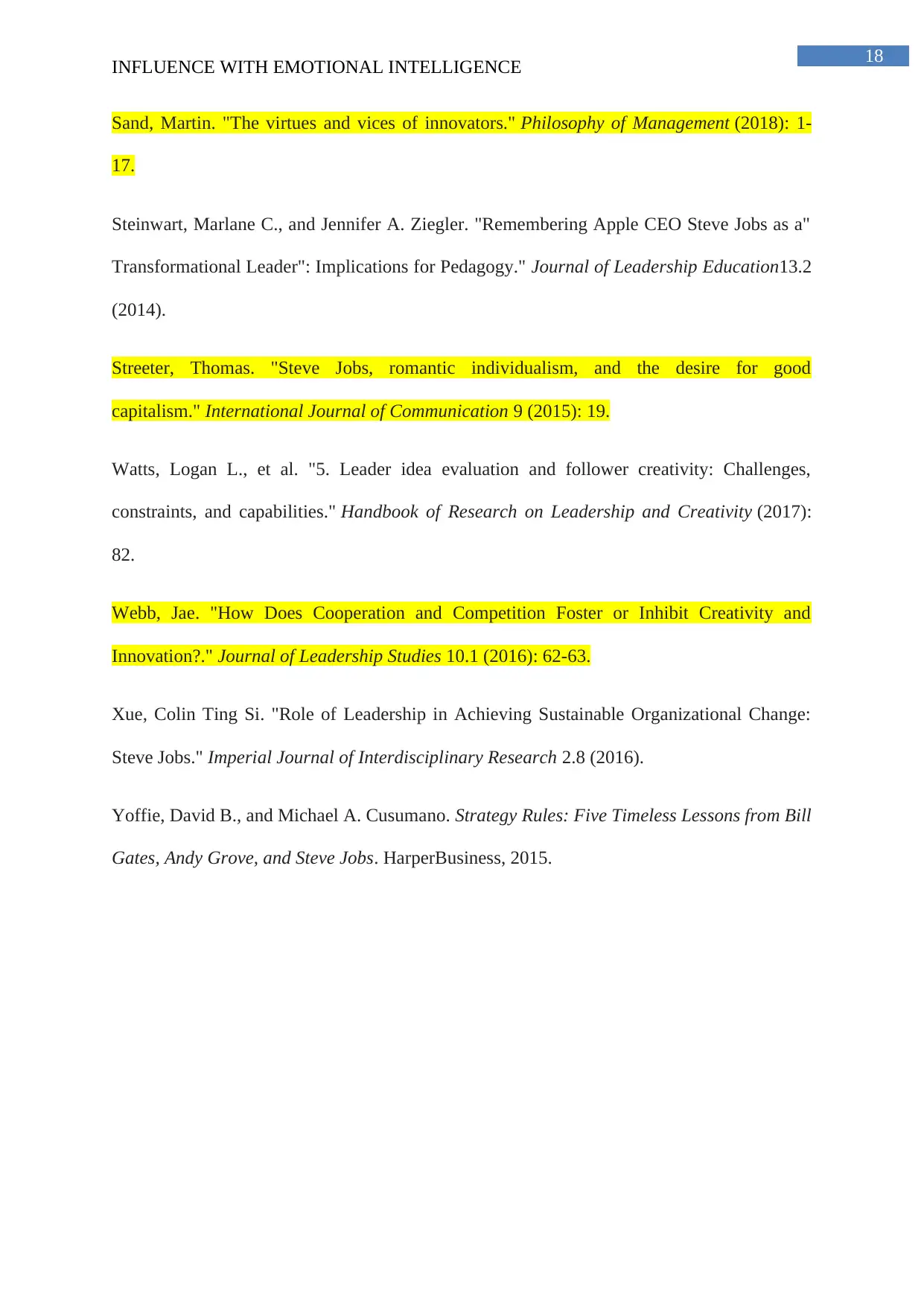
18
INFLUENCE WITH EMOTIONAL INTELLIGENCE
Sand, Martin. "The virtues and vices of innovators." Philosophy of Management (2018): 1-
17.
Steinwart, Marlane C., and Jennifer A. Ziegler. "Remembering Apple CEO Steve Jobs as a"
Transformational Leader": Implications for Pedagogy." Journal of Leadership Education13.2
(2014).
Streeter, Thomas. "Steve Jobs, romantic individualism, and the desire for good
capitalism." International Journal of Communication 9 (2015): 19.
Watts, Logan L., et al. "5. Leader idea evaluation and follower creativity: Challenges,
constraints, and capabilities." Handbook of Research on Leadership and Creativity (2017):
82.
Webb, Jae. "How Does Cooperation and Competition Foster or Inhibit Creativity and
Innovation?." Journal of Leadership Studies 10.1 (2016): 62-63.
Xue, Colin Ting Si. "Role of Leadership in Achieving Sustainable Organizational Change:
Steve Jobs." Imperial Journal of Interdisciplinary Research 2.8 (2016).
Yoffie, David B., and Michael A. Cusumano. Strategy Rules: Five Timeless Lessons from Bill
Gates, Andy Grove, and Steve Jobs. HarperBusiness, 2015.
INFLUENCE WITH EMOTIONAL INTELLIGENCE
Sand, Martin. "The virtues and vices of innovators." Philosophy of Management (2018): 1-
17.
Steinwart, Marlane C., and Jennifer A. Ziegler. "Remembering Apple CEO Steve Jobs as a"
Transformational Leader": Implications for Pedagogy." Journal of Leadership Education13.2
(2014).
Streeter, Thomas. "Steve Jobs, romantic individualism, and the desire for good
capitalism." International Journal of Communication 9 (2015): 19.
Watts, Logan L., et al. "5. Leader idea evaluation and follower creativity: Challenges,
constraints, and capabilities." Handbook of Research on Leadership and Creativity (2017):
82.
Webb, Jae. "How Does Cooperation and Competition Foster or Inhibit Creativity and
Innovation?." Journal of Leadership Studies 10.1 (2016): 62-63.
Xue, Colin Ting Si. "Role of Leadership in Achieving Sustainable Organizational Change:
Steve Jobs." Imperial Journal of Interdisciplinary Research 2.8 (2016).
Yoffie, David B., and Michael A. Cusumano. Strategy Rules: Five Timeless Lessons from Bill
Gates, Andy Grove, and Steve Jobs. HarperBusiness, 2015.
1 out of 18
Your All-in-One AI-Powered Toolkit for Academic Success.
+13062052269
info@desklib.com
Available 24*7 on WhatsApp / Email
![[object Object]](/_next/static/media/star-bottom.7253800d.svg)
Unlock your academic potential
© 2024 | Zucol Services PVT LTD | All rights reserved.
